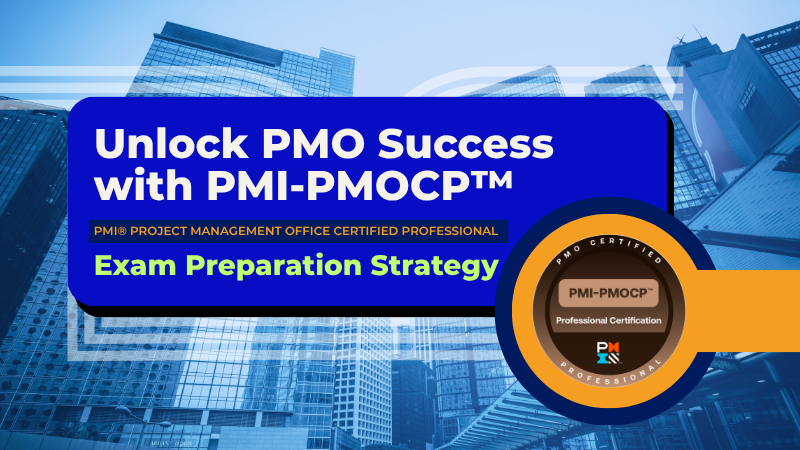
by DharamCW | Jul 24, 2025 | Leadership in Project Management, Portfolio Management, Program Management, Project Management, Project-Program-Portfolio Management Knowledge
Introduction
Project Management Offices (PMOs) are more than just administrative hubs in today’s busy business world. Businesses can adapt, provide value, and make wise decisions with the support of these strategic drives. As businesses look for professionals capable of spearheading this transformation, the PMI-PMOCP™ (PMO Certified Professional) has emerged as a highly regarded certification confirming both strategic insight and PMO leadership.
With the help of useful frameworks and leadership skills, PMI-PMI-PMOCP™ enables professionals to create, run, and develop PMOs that support organizational objectives. It positions certified leaders as important forces behind corporate transformation by signifying a change from traditional project oversight to strategic value delivery.
This article offers a detailed guide on obtaining the PMI-PMOCP™ certification, covering the exam layout, study schedule creation, leadership development, PMO capacity improvement, and finding resources and prep tools. It emphasizes the importance of developing leadership skills, improving PMO capacity with actual knowledge, and finding practical exam-day advice to maximize the certification’s impact on your career.
Unlocking career potential with PMI-PMOCP™
The growing focus on value-driven delivery and strategic alignment across businesses is changing the function of PMOs. Through specialised credentials like the PMI-PMOCP™, this shift has created a fantastic opportunity for people to progress in their careers. The certification attests to a deep understanding of PMO operations, governance frameworks, and business integration and is intended for PMO executives, team members, and portfolio professionals.
The PMI-PMOCP™ is a strategic facilitator for career progression that goes beyond a certification. It prepares professionals for positions influencing corporate decision-making rather than just operating coordination. With this certification, applicants can pursue senior roles that prioritize leadership and stakeholder engagement, such as Head of Strategic Initiatives, Enterprise PMO Manager, or PMO Director. Possessing the PMI-PMOCP™ boosts your reputation and demonstrates to potential employers that you are capable of starting, expanding, and optimizing PMOs for long-term impact in a global job market that is increasingly focused on measurable skills.
According to the Earning Power: Project Management Salary Survey—Twelfth Edition, only 61% of PMOs believe they are successful, and 93% of unbacked PMOs say their value is not understood by executives. These findings highlight the growing need for certified professionals who can lead strategic, value-driven PMOs.
Additionally, the certification promotes professional mobility across sectors and locations for those who want to lead change in complex settings. For seasoned professionals prepared to take on more senior leadership responsibilities, the PMI-PMOCP™ is a wise, forward-thinking investment in career development.
The Role of PMI-PMOCP™ in today’s evolving PMO landscape
The PMI‑PMOCP™ certification is essential for confirming the strategic abilities needed by modern businesses, as PMOs expand beyond their traditional administrative duties.
In a Broadcom survey, 96% of 501 multinational companies said they were becoming more reliant on PMOs to centralise project management and improve value delivery; 98% said they thought PMOs were critical, and 93% said they intended to grow their PMO operations. This modification emphasises the necessity of having skilled professionals lead these next-generation PMOs.
NTT DATA’s “Evolution of the PMO” report highlights how digitally empowered, agile PMOs are evolving into strategic value centres, leveraging analytics and artificial intelligence to improve productivity and decision-making. Because the PMI‑PMOCP™ evaluates all of these skills, these PMOs require leaders with expertise in governance maturity, digital tool execution, and integration with business strategy.
A great example of how they may increase their delivery flexibility is the PMO of Melbourne Airport, which used hybrid systems and became the only provider during COVID-19. By equipping them with the frameworks, stakeholder engagement techniques, and governance understanding required for PMOs in the digital era, certification equips PMO executives to spearhead such transformations.
PMI-PMOCP™ holders are prepared to guide companies through challenging transformation by collaborating closely with strategic portfolio and performance management methodologies. This ensures that PMO activities are not only monitored but also optimized for a company-wide impact.
Advancing from execution to strategy: A career shift enabled by PMI-PMOCP™
Building on this solid base, the PMI-PMOCP™ certification turns into a strong enabler for those trying to move from execution-centered jobs to strategic leadership posts. By arming PMO practitioners with the systems and competencies required to make significant decisions, it bridges the gap between operational delivery and corporate value realization. Experts who are certified manage portfolio priorities, align projects with corporate strategy, and assess results important to executive stakeholders. They are trained to handle tasks beyond the constraints of deadlines and scope. This change makes them as essential to corporate transformation by turning their function from task fulfillment to strategic advice.
In actuality, this change is quite apparent. After receiving PMI-PMOCP™, many professionals formerly in charge of project coordination have moved into roles such as Strategic Realization Office Lead, Director of Enterprise PMO, or Head of Delivery Governance. These positions call for more than just process knowledge; rather, the capacity to influence, negotiate, and generate results consistent with company objectives is required.
PMI-PMOCP™,’s focus on strategy alignment, advantage realization, and maturity models makes this career leap possible. For those seeking substantial expansion, it provides a clear path to influence portfolio-level decisions and lead the business from the front, making the shift from project manager to strategic leader a reality.
A closer look at the exam structure and core domains
The PMI-PMI-PMOCP™ exam is developed to evaluate both theoretical knowledge and practical capabilities since PMO leadership necessitates the development of real-world competencies. It assesses a candidate’s capacity to consciously plan, create, carry out, and improve PMO operations in a range of organizational contexts. Focused research necessitates domain and structural knowledge for subject matter experts.

Learn the PMI-PMOCP exam structure: 120 questions, 165-minute duration, online & in-center availability, and psychometric scoring. Prepare with confidence.
Key Exam Structure:
- Format: 120 multiple-choice questions (100 scored + 20 unscored pretest items)
- Duration: 165 minutes (2 hours 45 minutes), with one optional 10-minute break
- Mode: Available both online (proctored) and at exam centers
- Scoring: Pass/fail based on psychometric analysis (no fixed cutoff score)
Core Exam Domains and weightage:
- Organizational Development and Alignment (16%): Focuses on building organizational project management maturity and capability.
- PMO Strategic Elements (18%): Covers PMO vision, mandate, governance, and stakeholder engagement.
- PMO Design and Structuring (18%): Examines service design, customer-centricity, and value proposition.
- PMO Operation and Performance (15%): Assesses service delivery, resource management, and onboarding processes.
- PMO Enhancement and Effectiveness (18%): Emphasizes performance measurement, maturity models, and continuous improvement.
- People (15%): Evaluates leadership, interpersonal skills, and strategic thinking.

Master the 6 core domains of the PMI-PMOCP exam—get familiar with what matters most and where to focus your preparation.
Successful completion of the exam and practical implementation of ideas in real-world PMO scenarios are prerequisites for a thorough comprehension of these fields.
Designing a Smart Study Plan using the Exam Content Outline (ECO)
Having a well-organised and targeted study plan is essential for passing the PMI-PMOCPTM test. You may be sure that your preparation aligns with the fundamental abilities required of high-performing PMO staff by using the Exam Content Outline (ECO). Because it provides detailed instructions on domains, tasks, and enablers, the ECO is the most reliable place to start when creating your exam strategy.

Maximize your PMI-PMOCP prep with this 6-step study plan—prioritize domain weights, apply case-based learning, and grow strategic PMO skills.
Steps to create an efficient study schedule:
- Get to know the Domain Weights: Based on the domain percentage (e.g., PMO Strategic Elements and PMO Design each carry 18%), give study time top focus.
- Divide Projects and Enablers: Translate every domain into actual situations to internalize ideas and gauge practical understanding.
- Mapping Experience to Competencies: Find locations where your hands-on PMO knowledge complements or falls short of ECO job coverage.
- Assign objectives for weekly study: Assign particular domains per week using a calendar, therefore balancing theory review, case analysis, and practical experience.
- Use Case-Based Learning: Deepen your awareness of stakeholder engagement, service design, and performance measures by using case studies and sample scenarios.
- Regular Reviews and Revisions: Set weekly reviews and strengthen underperforming areas found through self-evaluations or mock examinations.
Keeping up with the ECO helps you concentrate on your studies and learning PMO leadership skills that are both career-oriented and relevant to exams.
Growing your strategic thinking and leadership skills
The ECO’s study plan equips candidates with leadership and other critical abilities that go beyond test preparation. The PMI-PMOCP™ certification aids in the development of strategic thinking and leadership skills that are necessary for directing organisational effect through the PMO.

Grow your PMO leadership impact with PMI-PMOCP™ – from strategic alignment and governance to stakeholder influence and executive presence.
The PMOCP™ process plays a vital role in supporting leadership and strategic development, like:
- Improves strategic alignment: Enhances your capacity to align portfolio and program results with organizational objectives and long-term vision.
- Develops stakeholder engagement capabilities:Builds stakeholder engagement skills by enhancing communication, negotiating, and relationship-building across executive, functional, and delivery teams.
- Fosters systems thinking: Encourages systems thinking by showing you how to evaluate linkages across projects and portfolios to provide a more expansive viewpoint.
- Enhancing governance and risk leadership: Arms you with instruments to proactively handle strategic risks and set up efficient decision-making systems.
- Supports data-informed decision-making: Encourages the use of key performance indicators and maturity models to drive ongoing improvement.
- Builds executive-level presence:Helps you portray PMO value in business terms and direct influence at the leadership table, establishing an executive-level presence.
Professionals grow into forward-thinking leaders who help the PMO serve as a catalyst for strategy execution and corporate transformation via the PMOCP™ certification process.
Strengthening your PMO capabilities with practical knowledge
Building realistic, hands-on skills is vital as PMOs become strategic allies inside companies. Meant to improve not only theoretical understanding but also the practical application of PMO ideas across a range of business scenarios, the PMI-PMOCP™ certification is also meant to help. By means of its six key domains, the certification assists professionals in enhancing their capacity to plan and run PMOs that match the objectives of the company. Candidates acquire knowledge on how to establish performance measures that show quantifiable impact, execute governance systems, and define distinct PMO service offerings.
Moreover, stressed in the program stresses capacity building via maturity assessments, feedback systems, and continuous improvement approaches. PMO leaders may routinely evaluate success and change their services to meet changing corporate demands using these tools. Furthermore, the certification strengthens core talents in benefit realization, stakeholder management, and resource planning. Professionals become better prepared to head high-performing PMOs supporting both agile and traditional delivery environments by means of this understanding.
The pragmatic frameworks discussed in the PMI-PMOCP™ program help you to develop fit-for-purpose ideas, whether you are building a new PMO or improving one already in place. Maintaining long-term value and positioning the PMO as a reliable strategic player in the company depends on this capacity.
Tools, resources, and prep courses to accelerate your growth
It takes more than just reading to get ready for the PMI-PMOCP™ certification. A strategic plan needs to be backed up by relevant materials, instructional materials, and systematic learning in order to be successful. For PMO experts looking to increase their knowledge and improve their test preparation, using targeted information is essential.
Your preparation route is supported by a number of high-quality materials. These materials make it possible to use concepts in real-world PMO scenarios in addition to passing the exam.
Suggested learning resources and tools include:

Ace the PMI-PMOCP exam with the right resources: ECO, case studies, question banks, and memory aids like flashcards and mind maps.
- Exam Content Outline (ECO): The ECO serves as the foundation for all study plans. It divides areas, chores, and facilitators that you have to learn.
- Case Studies and Real-World Scenarios: Connect theory to real-world PMO decision-making by using industry case studies.
- Practice Exams and Question Banks: Regular exams help expose areas of deficiency and prepare you more effectively for exams using practice exams and question banks.
- Flashcards and Mind Maps: Excellent for remembering concepts, models, and vocabulary via flashcards and Mind Maps.
PMO Capability Maturity Models and Templates: Help you to grasp strategic alignment and operational excellence.
A selection of the best preparation programs:
• Instructor-led boot camps focused on domain-wise learning
• On-demand video lectures enabling flexible study
• Peer discussion groups and study cohorts for collaborative learning
Exploring thought leadership blogs, PMO podcasts, and LinkedIn learning spaces helps bring in wider perspectives and expert insights. The newly launched PMOCP4U LinkedIn group offers a dedicated space for PMO professionals and PMI-PMOCP™ aspirants to connect, exchange resources, and grow together. Building lasting capability in PMO leadership and true exam confidence, depends on combining structured preparation with practical, real-world dialogue
Exam-day confidence: Tips to manage time and approach questions
More than technical ability is needed for success on the day of the exams. It calls for confidence, concentration, and a well-practiced approach. The PMI-PMOCP™ exam seeks to assess your capacity to apply PMO ideas in realistic and sometimes difficult situations as well as your knowledge of PMO concepts.
Time management and a bold approach to the exam are crucial:

Maximize your exam success with these 5 time-tested PMI-PMOCP strategies—clarity, direction, pacing, and smart elimination.
- Start your day with clarity: If you are taking the exam online, arrive early for check-in or system testing, get a full night’s sleep, and eat properly.
- Read the directions thoroughly: During the first several minutes, get acquainted with the navigation and structure of the questions.
- Adopt a three-round approach: First, respond to questions you are certain of. Second, try rather challenging ones. Last, go back to any questions marked or time-consuming.
- Track your time without pressure:Target to finish the first 60 questions in around 80 minutes, allowing adequate time for the other parts, so monitor your time without pressure.
- Employ elimination techniques: Especially in scenario-based problems, eliminate wrong possibilities to enhance accuracy. Wise optional break: Use this time to refocus and reset for the second half of the exam.
Supported by thorough preparation, a calm and organized approach will enable you to negotiate the exam with confidence and clarity.
From certification to career growth: Making the most of PMI-PMOCP™
Getting the PMI‑PMOCP™ certification is just the first step; true professional development results from your use of it. According to the Master of Project Academy’s recent data, 35. 8% of project-related certified professionals saw a 10% plus salary increase after getting their credentials, and 41. 1% found promotions or new positions. This implies that rather than only validating abilities, certification results in noticeable progress.

PMI-PMOCP isn’t just a certification—it’s your launchpad to leadership, strategic impact, and better pay.
In your role as a PMO specialist, you aim to utilize your qualifications for actual career advancement:
- Highlight measurable results:Show projects where your PMO techniques enhanced performance, governance, or stakeholder satisfaction to position yourself as a business-value driver. Highlight measurable outcomes.
- Aim for strategic PMO roles: Many PMOCP™ holders assume leadership positions like PMO Director, Portfolio Governance Manager, or Head of Delivery Strategy, roles that call for the precise skills indicated by the certification.
- Leverage in job negotiations: Negotiate compensation, role level, or responsibility using achievements linked to credentials. Usually, certified professionals have greater initial pay.
Organizations are also aggressively seeking PMO-certified specialists to bridge the gap between strategy and implementation. Certification like PMOCP™ have genuine market relevance as PMOs more and more promote hybrid delivery, data-driven decision-making, and digital transformation. You must possess not only process-oriented skills but also strategic thinking, data literacy, and an agile mindset.
Action plan for post-certification success:

PMOCP™ is just the beginning. These 4 post-certification strategies can define your leadership path and strategic influence.
- Refresh your brand: Build your brand identity by using PMOCP™ on LinkedIn, your resume, and profiles while sharing success stories related to corporate influence.
- Communicate with PMO circle: Take part in PMO-oriented conversations, podcasts & webinars, and more in person to network and share ideas and raise awareness.
- Pursue high-impact internal projects:To show strategic leadership, volunteer for internal cross-functional or digital project programs inside your company.
- Seek formal or informal mentorship:Ask senior PMO leaders for advice on managing strategic roles or growing PMO capacity and look for formal or informal mentorship.
You are not just confirming your abilities by deftly matching your certified skills to organizational needs and highlighting your impact, but also hastening a deliberate move into senior PMO leadership. The PMI PMOCP™ can be the catalyst that changes your career path, thereby converting a certification into permanent professional development.
Conclusion
The PMI-PMOCP™ certification is more than simply a scholastic achievement in today’s evolving PMO landscape; it is a strategic gateway to leadership and professional advancement. From the beginning of the planning process, professionals gain insight on how to maximize stakeholder impact, align PMO duties with company vision, and provide demonstrable value. Through a well-organized study plan, a deep understanding of the Exam Content Outline (ECO), and an emphasis on real-world application, candidates get a mix of knowledge and leadership abilities that are immediately applicable in the workplace.
When experts look into the certification, they find several important questions, such as:
- How does PMI-PMOCP™ distinguish itself from other project management certifications?
- Will this certification enable me to advance to a strategic or leadership position?
- How may I show my employer the advantages of certification?
- Do long-term professional benefits outweigh the time and money invested?
- How can I apply and maintain my knowledge if I pass the examination?
These questions are not only genuine, but they also provide insights from professionals who are about to make important advancements. The answer depends on how the certification is used.
I had the opportunity to speak with PMI’s Kim Marcelliano about the strategic relevance of the PMI-PMOCP™ certification.
Upcoming PMI-PMOCP™ programs led by me will offer a structured path for professionals looking to deepen their PMO capabilities and earn this strategic credential. I’m excited to support and share these initiatives as they unfold.
Upcoming PMI-PMOCP Exam Prep Training 2025:
Online PMI-PMOCP Bootcamp:
- 27–28 September, 9am-5pm, CDT | Link: https://bit.ly/4mrfBHo
- 7-8 November, 7 am – 3 pm CST | Link: https://bit.ly/3FRlr4i
- 15 – 16 November, 9am-5pm, CST | Link: https://bit.ly/4jbZGcY
Direct PMI-PMOCP Bootcamp, Dallas, USA :
- 17-18 November, 9am-5pm, CST | Link: https://bit.ly/3Zqlgn2
- 13-14 December, 9am-5pm CST | Link: https://bit.ly/4drorAA
When used strategically, PMI-PMOCP™ not only validates your expertise but also positions you to drive change, provide value, and shape your company’s future through a productive PMO.
#PMIPMOCP #PMOCertification #PMOLeadership #ProjectManagement #StrategicLeadership #PMOCareer #DharamSingh #vCareProjectManagement #PMIATP #PMOCPExamPrep #PortfolioGovernance #PMOTransformation #ExamSuccess #PMOStudyTools #PMOCPJourney
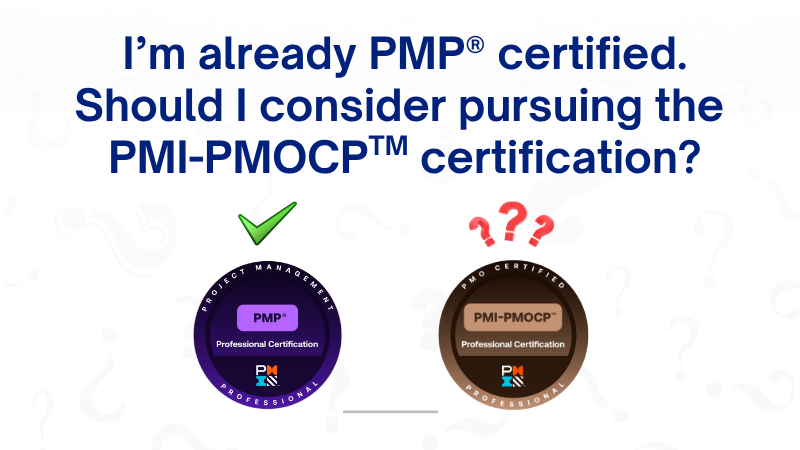
by DharamCW | Jul 22, 2025 | Leadership in Project Management, Project-Program-Portfolio Management Knowledge
Episode 1: Should You Pursue PMI-PMOCP After PMP? | PMO Leadership, Certification Benefits & Career Growth | Kim Marcelliano | Dharam Singh | vCare PMI PMOCP Webinar Insights Podcast Series: PMI-PMOCP Certification | PMO Leadership, Exam Guide, ECO & Career Growth
Guest: Kim Marcelliano, Senior Product Manager at PMI Host: Dharam Singh, Leading PMP, PgMP & PfMP Mentor
Question: I’m already PMP® certified. Should I consider pursuing the PMI-PMOCP™ certification?
Description: In this insightful episode, Kim Marcelliano answers a question many PMP® holders are asking: is the PMI-PMOCP™ credential the right next step? Kim explains how the PMP® focuses on managing individual projects, while PMI-PMOCP™ equips professionals to lead and influence the PMO at a strategic level. As organizations increasingly rely on PMOs to drive value and transformation, project managers are being called upon to contribute beyond task execution. For PMP® certified professionals ready to expand their influence and visibility within their organizations, PMI-PMOCP™ offers a complementary pathway to demonstrate leadership in driving enterprise-wide project success. 🎯 Key Takeaways:
- PMP and PMI-PMOCP serve distinct but complementary roles
- PMOCP is ideal for those involved in PMO leadership or aspiring to it
- PMP® is about managing projects; PMOCP is about elevating PMO strategy
- Certification validates your ability to align projects with organizational value
- PMOCP helps PMP® holders transition from project delivery to strategic impact
About Our Guest: Kim Marcelliano is a dynamic Senior Product Manager at PMI with over a decade of experience in managing global certification products and online learning strategies. Known for her entrepreneurial mindset and deep expertise in cross-functional leadership, Kim brings a blend of market intelligence, emotional intelligence, and innovation to every product she shapes. She is also a Certified EQ Coach and a passionate advocate for personal growth and leadership. About the Host: Dharam Singh is a globally recognized PMP®, PgMP®, and PfMP® mentor and CEO of vCare Project Management. With 30 years of leadership experience across industries and more than 576+ PgMP , 181 PfMP and 1000s of PMP mentees globally, he is an influential voice in the project management community and a tireless advocate for career advancement through PMI certifications.
⏱ Time Stamps:
00:00 – Introduction
00:10 – I’m already PMP certified. Should I pursue PMI-PMOCP?
00:40 – PMP vs PMI-PMOCP: Different roles, complementary value
01:28 – How PMI-PMOCP Certification going to help me?
Connect With our Speakers:
1. Kim Marcelliano:  / kmarcelliano
/ kmarcelliano
2. Dharam Singh:  / dharamsingh
/ dharamsingh
Upcoming PMI-PMOCP Exam Prep Training 2025:
Online PMI-PMOCP Bootcamp:
1. 27–28 September, 9am-5pm, CDT | Link: https://bit.ly/4mrfBHo
2. 7-8 November, 7 am – 3 pm CST | Link: https://bit.ly/3FRlr4i
3. 15 – 16 November, 9am-5pm, CST | Link: https://bit.ly/4jbZGcY
Direct PMI-PMOCP Bootcamp, Dallas, USA :
1. 17-18 November, 9am-5pm, CST | Link: https://bit.ly/3Zqlgn2
2. 13-14 December, 9am-5pm CST | Link: https://bit.ly/4drorAA
Contact Us: Call us: +1 972 292 7588 / +1 650 283 0123 (U.S.)
Free Consultation: Book a free 15-minute session with Dharam Singh, http://talktodharam.com
Subscribe for More: PgMP & PfMP Success Stories https://bit.ly/2YF0wJl
Dharam Singh Podcasts and Interviews: https://bit.ly/2NDY8wd
Direct Bootcamps:
PMOCP: https://bit.ly/4jnDUmY
Online Programs
PMOCP: https://bit.ly/4dKY35f
LinkedIn Study Groups PMOCP4U:  / 14744039
/ 14744039
#PMIPMOCP #PMPtoPMOCP #PMOCertification #ProjectManagement #StrategicLeadership #CareerGrowth #PMOLeadership #vCareProjectManagement #DharamSingh #KimMarcelliano #PMICertifications #PMPJourney #PMOCareerPath #PMO #PMI #LeadershipCertification #PMOCPWebinar #PMPVsPMOCP #PMIATP
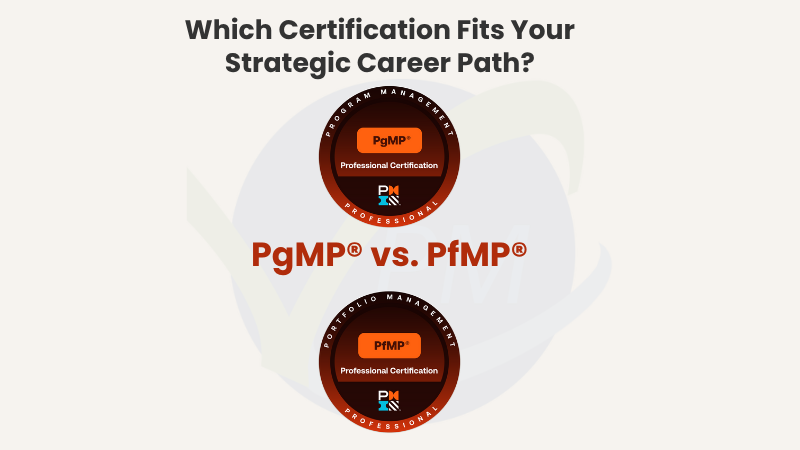
by DharamCW | Jul 12, 2025 | Leadership in Project Management, Portfolio Management, Program Management, Project Management, Project-Program-Portfolio Management Knowledge
PgMP vs PfMP – Which Certification Fits Your Strategic Career Path?
In today’s rapidly evolving business landscape, the ability to lead with strategy, agility, and value alignment is no longer optional. It’s essential. If you’re navigating the path between program management and portfolio leadership, understanding the core distinctions between PgMP and PfMP is critical.
This side-by-side comparison is built directly from the official PMI Examination Content Outlines. It will help you assess:
– The Primary Purpose of each certification
– The Strategic Function it enables
– The Key Domains you’ll master
– The Core Activities you’ll drive
– And ultimately, who it’s Ideal For
Having sucessfully mentored over 576+ PgMPs and 180+ PfMPs globally, I’ve seen how the right certification choice accelerates leadership journeys.
– No fluff. No assumptions. Just clarity based on facts.
– Take a closer look at the visual and tell me in the comments:
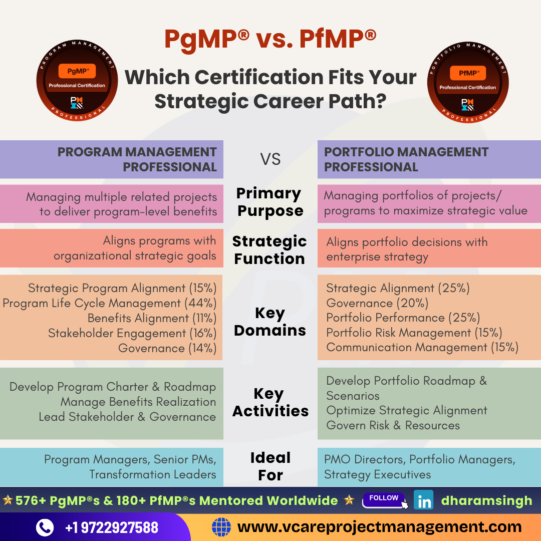
Confused between PgMP and PfMP? See how each certification supports distinct strategic roles—and choose the right path for your leadership journey.
Which path reflects your next leadership move – PgMP or PfMP?
If you’re still unsure which one best fits your goals, book a personalized, obligation-free consultation session with me at http://talktodharam.com
📌 View our upcoming PgMP Programs
Online Training → http://bit.ly/2oBKQXQ
Direct Training → http://bit.ly/2oCfpg0
📌 View our upcoming PfMP Programs
Online Training → http://bit.ly/39jOZSf
Direct Training → http://bit.ly/38er2M3
Subscribe for Stories & Insights:
Success Stories & Q&A → https://bit.ly/2YF0wJl
Podcasts & Interviews → https://bit.ly/2NDY8wd
#PgMP #PfMP #PMICertifications #ProgramManagement #PortfolioManagement #StrategicLeadership #ProjectLeadership #CareerGrowth #PMO #BenefitsRealization #vCareProjectManagement #DharamSingh #ProjectMentoring #LeadershipDevelopment #PgMPvsPfMP #PMI #ProjectSuccess #PfMPJourney #PgMPCertification #DecisionMaking
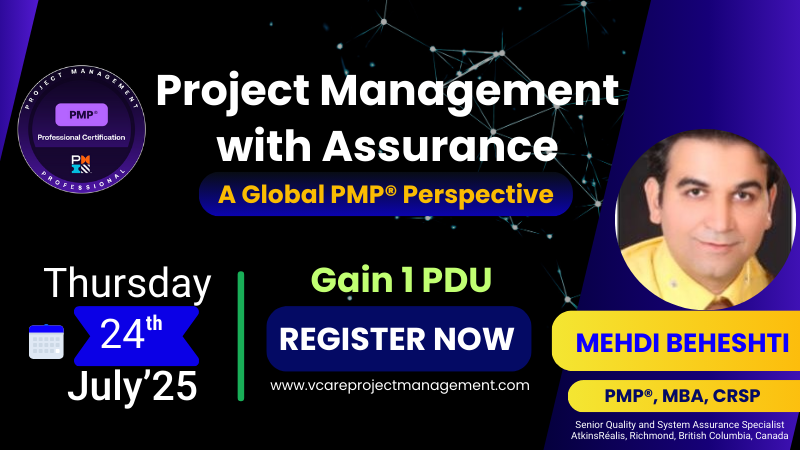
by DharamCW | Jul 7, 2025 | Leadership in Project Management, Professional Development Webinars
🔐 Are you managing projects in high-stakes, regulated environments? Then this conversation is for you.
In today’s complex world, assurance isn’t optional—it’s essential.
Join me for an insightful Q&A session with Mehdi Beheshti, PMP, MBA, CRSP, where we discuss how assurance, compliance, and PMP® certification shape the future of resilient project leadership.
🎙️ Mehdi brings real-world expertise from his work at AtkinsRéalis, Canada, managing safety and systems assurance in major infrastructure programs.
I’m truly looking forward to unpacking his journey—from PMP® certification to growing into a leader in HSQE and beyond.
🎯 1 PDU | FREE Registration → https://bit.ly/3ThnjXg
📅 Thursday, 24th July 2025
Time:
Thursday, 24th July 2025: 02:30 PM – 03:30 PM (PDT) / 03:30 PM – 04:30 PM (MDT) / 04:30 PM – 05:30 PM (CDT) / 05:30 PM – 06:30 PM (EDT) / 06:30 PM – 07:30 PM (BRT) / 10:30 PM – 11:30 PM (BST)
Friday, 25th July 2025: 07:30 AM – 08:30 AM (AEST) / 09:30 AM – 10:30 AM (NZST)
💡 What can you expect to take away?
✔ The Global Value of PMP® Certification
✔ Embedding Assurance from Day One
✔ Risk in High-Stakes Infrastructure Projects
✔ Engaging Teams for Safety and Compliance
✔ Balancing Compliance with Tight Deadlines
✔ Navigating Projects Across Borders
✔ AI’s Emerging Role in Risk and Assurance
✔ Transitioning from HSQE Specialist to Leader
📌 Whether you’re preparing for your PMP®, leading compliance-heavy portfolios, or aiming to build globally aligned practices—this is your opportunity to learn, grow, and lead with confidence.
📌 Looking for expert guidance on the PMP® application, preparation, or exam strategy? Let’s talk! Book Obligation-free consultation session using http://talktodharam.com, and shape your PMP® success story together!
👉 Also explore our PMP Programs
🌐 Online: https://bit.ly/2BU0mFp
📍 Direct: http://bit.ly/3ic7GRF
🧾 Application Support: http://bit.ly/3esggIb
👥 Join our LinkedIn community: https://bit.ly/30gV5QX
#PMPTraining #PMPExamSuccess #ProjectLeadership #RiskManagementStrategy #ComplianceMatters #AssuranceInProjects #InfrastructureProjectManagement #AIInProjectManagement #PDUEligible #FutureOfPM #vCareProjectManagement #DharamSinghMentor #PMICertifications #SafetyInProjectManagement #GlobalProjectManager #QualityAndAssurance #ProgramManagementExpert #PMPJourneyWithvCare #PMPWebinar #LeadershipInProjects #MehdiBeheshti
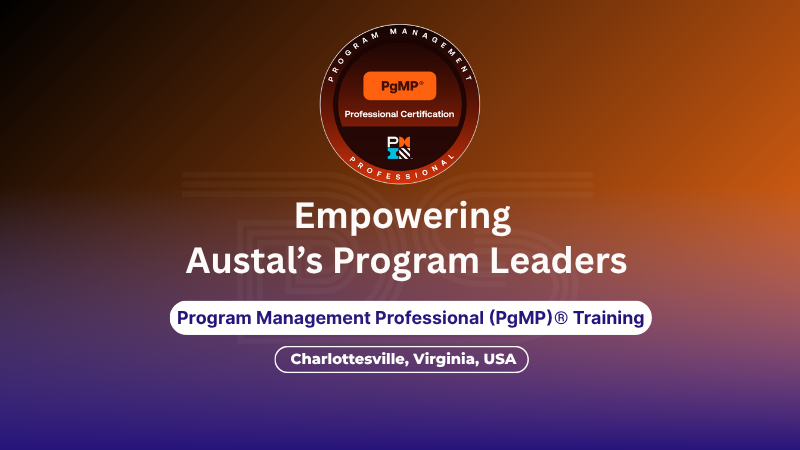
by DharamCW | Jun 22, 2025 | Leadership in Project Management, Professional Resilience and Inspiration Stories, Program Management
Is your organization building ships — or shaping leaders who can steer strategic transformation?
That’s the kind of question we explored with Austal USA‘s program leaders during a powerful 3-day PgMP® Bootcamp in Charlottesville, Virginia.
🗓️ Date: May 28–30, 2025
📍 Location: Charlottesville, VA, USA
🎯 Focus: Empowering Austal’s Program Managers with PgMP® principles that align execution with enterprise strategy.
Austal, a globally recognized force in shipbuilding and defense, brought together a group of thoughtful, driven professionals. What stood out? Their willingness to rethink leadership, embrace strategic thinking, and reframe program execution as a tool for transformation.
This wasn’t just about frameworks — it was about translating theory into action through real-world conversations, challenges, and insights. Their energy, discipline, and curiosity made this journey meaningful for everyone involved.
To the entire Austal team: thank you for your professionalism and drive. It was an honor to be part of your leadership journey.
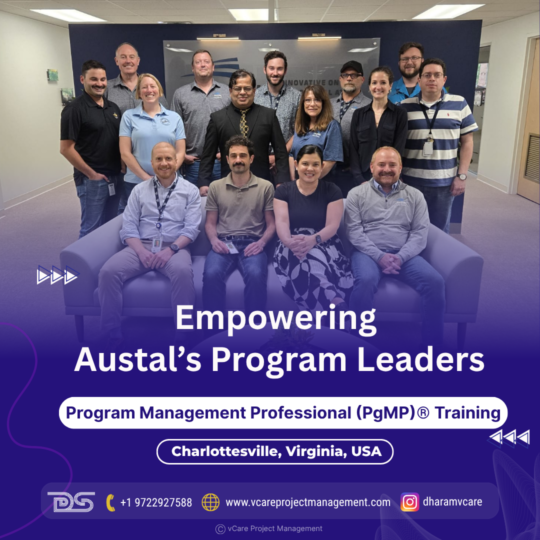
PgMP Bootcamp with Austal USA – Empowering program leaders to align execution with enterprise strategy.
👥 Interested in strengthening your program leadership team?
Our PgMP® Corporate Bootcamps are available globally.
📩 Email: team@vcareprojectmanagement.com
📞 Call: +1 9722927588
🔗 Book a Free consultation: http://talktodharam.com
#PgMP #ProgramManagement #StrategicLeadership #CorporateTraining #LeadershipDevelopment #AustalUSA #DefenseIndustry #Shipbuilding #PgMPBootcamp #vCareProjectManagement #DharamSingh #ProgramLeadership #EnterpriseStrategy #PgMPMentoring #CareerGrowth #MentorshipMatters #ProgramExecution #ProgramSuccess #LeadershipJourney #TransformationLeadership
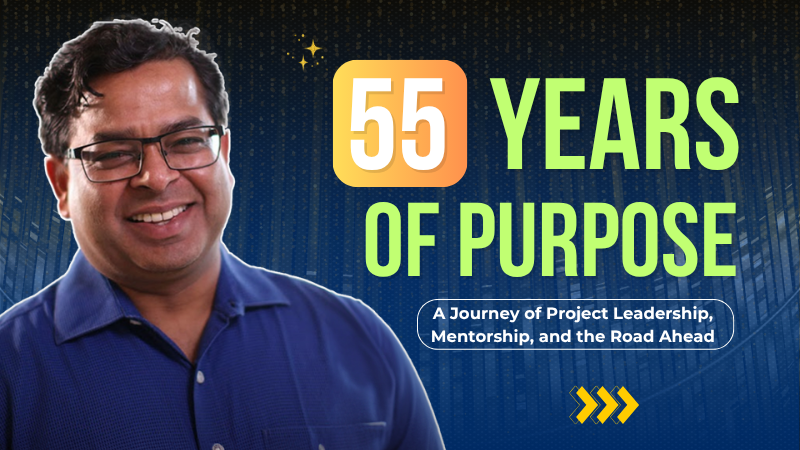
by DharamCW | Jun 20, 2025 | Leadership in Project Management, Portfolio Management, Program Management, Project Management, Project-Program-Portfolio Management Knowledge
Turning 55 makes me reflect on a journey built not just on time, but on projects, people, and a purpose that has guided me throughout. From a hands-on practitioner to a worldwide mentor directing professionals in navigating their paths in project leadership, this has been a learning-based journey for me.
“A leader is one who knows the way goes the way and shows the way.” – John C. Maxwell
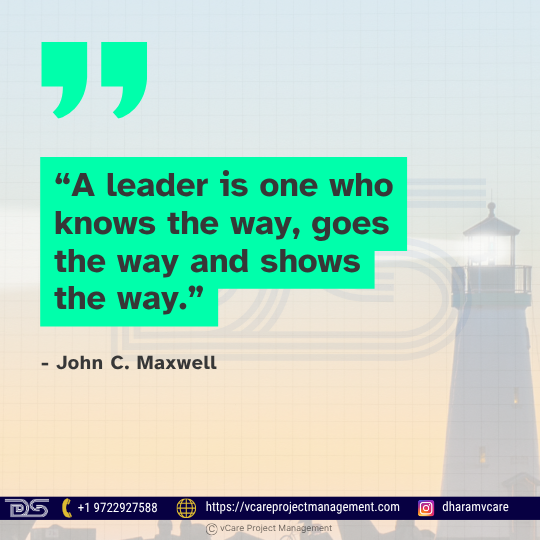
“Turning 55 reminds me—great leadership is about knowing the way, going the way, and showing the way.”
As the field of project management is evolving rapidly, bringing both complex challenges and exciting opportunities. Professionals often begin their journey with foundational credentials such as CAPM®, PMI Project Management Ready™, and PMI Kickoff™, which provide a solid base for advanced certifications like PMP®. As they grow in expertise and responsibility, many pursue specialized credentials such as PgMP® for program management and PfMP® for strategic portfolio management, emphasizing leadership, strategic thinking, and technical proficiency.
To further strengthen capabilities in PMO management and organizational alignment, PMI has recently launched the PMO Certified Professional (PMOCP)™. Collectively, these certifications offer a structured pathway for developing resilient, future-ready leaders equipped to navigate today’s dynamic project landscape.
Reflecting at 55: A Journey Built on Projects, People, and Purpose
I still find myself thinking about some basic concerns even after all these years of project, program, and portfolio management experience. These are not merely questions; rather, they are reflective thoughts that help me stay grounded, receptive to ongoing learning, and in line with the dynamic nature of our line of work. They remind us that no matter how far we’ve come, growth is an ongoing process. These important questions keep coming to mind:
1. How do I stay truly relevant in today’s fast-changing project world?
2. What really makes a mentor different from a practitioner in project leadership?
3. Can a career build on purpose last longer than one focused only on results?
4. What kind of mind-set does someone need to succeed in earning PgMP® or PfMP® certification?
5. How do I keep growing when the industry, tools, and expectations are always evolving?
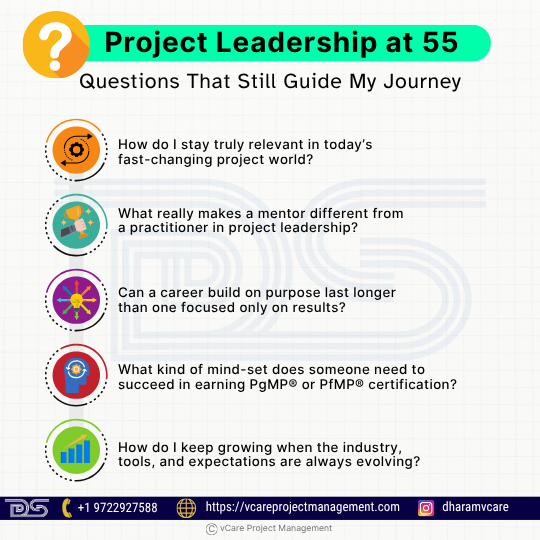
At 55, Dharam Singh reflects on the timeless questions that continue to shape great project leaders and mentors.
These questions shape the way I lead and mentor. They influence how I train, how I support aspirants, and how I walk alongside them on their certification journey. I believe these are not just personal reflections, but essential questions that every committed project leader must explore as they progress in their professional path.
From Practitioner to Global Mentor: My Evolution in Project Leadership
When I started my journey in project management, my focus was on project delivery. I concentrated on meeting deadlines, achieving goals, and satisfying stakeholders. Over time, as I led diverse teams and handled complex programs across sectors, my perspective began to shift. I started to value the power of strategic alignment and the human side of leadership. One of my most meaningful moments came when a former trainee told me that earning their PgMP® changed their entire career path. That made me realize mentorship was not just support, it was impact.
Becoming a global mentor was never part of a grand plan. It happened as I shared lessons, simplified complex concepts, and helped others unlock their potential. Today, I guide aspirants not only through certification paths but through mind-set transformation. I remind them that leadership is not about control, but about clarity, consistency, and contributing to the growth of others.
PgMP® and PfMP®: More Relevant Than Ever in Today’s Project Economy
Certifications like PgMP® and PfMP® have become increasingly important in today’s dynamic project environment. They not only validate advanced project leadership but also represent a professional’s commitment to driving impactful change in an innovation-driven world. These certifications empower professionals with strategic thinking, cross-functional leadership, and the ability to deliver results aligned with organizational goals.
PgMP® – Program Management Professional
The PgMP® credential is tailored for professionals managing multiple, related projects and achieving strategic objectives. It reflects leadership at a higher level, beyond individual project delivery.
Key aspects are:
• It focuses on managing complex programs and aligning them with strategic goals.
• It emphasizes benefits realization and stakeholder alignment.
• PgMP® is ideal for experienced project managers ready to scale up to program leadership.
Global Impact of vCare Project Management in PgMP® certification are:
1. North America
• United States: 11.2%
• Canada: 9.7%
• Mexico: 12.0%
2. Asia & Middle East
• India: 14.5%
• Saudi Arabia: 5.5%
• United Arab Emirates: 13.4%
• Singapore: 14.3%
• Malaysia: 26.0%
• Kuwait: 7.7%
3. Oceania
• Australia: 35.0%
• New Zealand: 35.0%
4. Europe
• Germany: 13.75%
• Italy: 17.2%
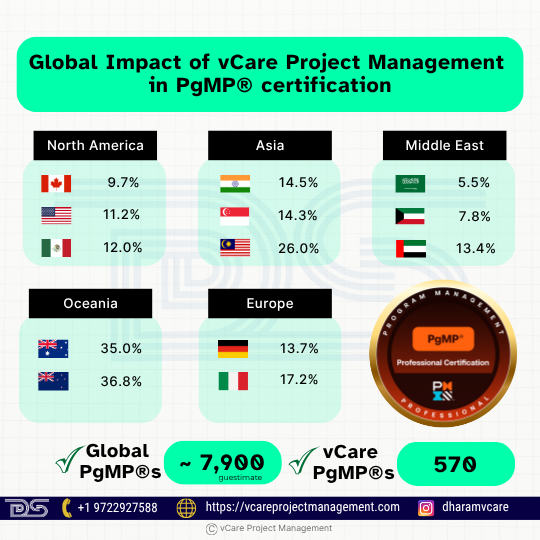
From practitioner to global mentor—Dharam Singh reflects on a leadership journey rooted in purpose and impact.
PfMP® – Portfolio Management Professional
The PfMP® credential is designed for senior professionals who manage portfolios of programs and projects aligned with strategic business objectives.
Key Highlights:
• It focuses on portfolio strategy, governance, performance, and risk management.
• It equips leaders to prioritize initiatives and optimize investments.
• It is ideal for executives and portfolio managers driving organizational value.
Global Impact of vCare Project Management in PfMP®:
1. North America
• United States: 10.0%
• Canada: 12.0%
2. Asia & Middle East
• Saudi Arabia: 3.4%
• India: 6.0%
• United Arab Emirates: 8.8%
• Qatar: 23.8%
• China, mainland: 1.5%
3. Oceania
• Australia: 50.0%
• New Zealand: 66.6%
4. Europe
• Germany: 18.8%
• Greece: 33.3%
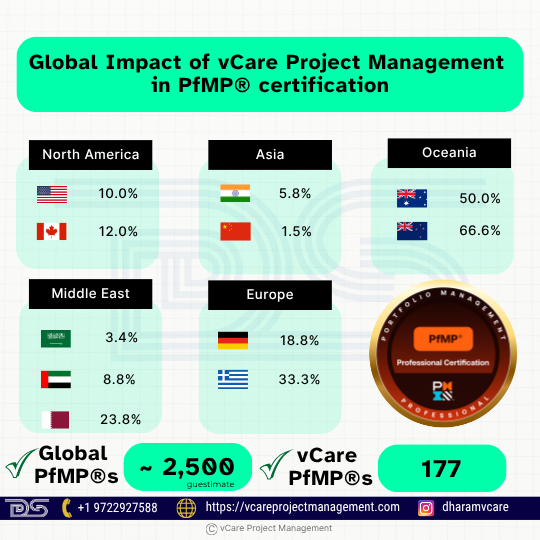
PfMP equips senior professionals to align portfolios with strategy and drive high-impact results—see how vCare supports global leaders in this mission.
These vCare contribution percentages clearly highlight the organization’s strong global presence and its impactful role in shaping certified leaders across continents.
According to the PMI Registry, the global certification landscape shows that China has approximately 2580+ PgMP’s and the United States has approximately 1500+ PgMP’s and these are the top two countries in the world for PgMP® certifications, reflecting their deep investment in advanced program management capabilities. When it comes to PfMP®, the The United States continues to lead globally with approximately 574+ PfMPs, while Saudi Arabia, now in second place with around 564+, is rapidly closing the gap in its push to become the global leader in strategic portfolio management.
Against this global backdrop, vCare’s consistent mentoring excellence continues to empower professionals to not only earn these elite credentials but to lead with clarity, confidence, and purpose.
The Certification Mindset: Forging Resilient, Strategic Leaders for a Complex World
PgMP® and PfMP® certificates can change the way professionals think, which helps them lead with foresight, deal with complexity, and make sure that projects are in line with the goals of the organisation. This way of thinking promotes learning for life, self-control, and being open to change. It also helps people become stronger, by teaching them how to deal with uncertainty, stay focused, and think critically. Certified leaders are renowned for their expertise and the way they use it in a world where things are always evolving, breakdown, and generating new concepts. You must think like this if you want to be a successful leader and remain relevant for a long time.
AI in Project Management: Disruptor, Enabler, or Strategic Partner?
AI is transforming the project management environment across various sectors, with experts unsure whether it is a strategic partner, enabler, or disruptor. However, when approached with knowledge and preparedness, AI becomes a strong facilitator, automating operations, boosting risk management, and streamlining resource planning. This allows project managers to focus on higher-value work, such as strategic decision-making, innovation, and stakeholder engagement.
AI makes consistent decision-making easier, implementation faster, and reduces complexity. Real-time data insights help teams work more efficiently and adapt quickly. Incorporating AI tools into daily project processes is essential for modern project ecosystems, reducing manual errors, improving accuracy, and ensuring on-time delivery.
AI can handle and analyze large amounts of data, but ethical supervision, context, and direction still rely on human leadership. Merging artificial intelligence with human insight leads to better outcomes, imagination, and strong project plans. Project managers must appreciate the possibilities of AI and use it appropriately, as those who see AI as an enabler of smarter, more agile project management rather than a threat will be ideally positioned to lead the next generation of high-performing, technology-driven projects.
Staying Human in the Age of AI: Essential Practices for Project Leaders
The role of a project leader, in my opinion, becomes even more human-centric as AI continues to change the field of project management. I adhere to the following crucial procedures and advise others who want to lead successfully in this AI-driven age:
1. Stress the importance of emotional intelligence and empathy – Make a human connection with your teammates. The emotional depth needed to inspire and establish trust cannot be replaced by technology.
2. Pay attention to stakeholder communication – Leaders need to manage relationships while AI handles data. Communication that is honest, transparent, and compassionate is still essential.
3. Combine judgement and data – Utilise AI-generated insights, but always use human judgement to understand long-term effects, context, and values.
4. Establish a culture of education – Teams should be encouraged to remain inquisitive and receptive to advancements in technology and people.
5. Encourage morality and diversity – Make sure AI-powered decisions are impartial, open, and consistent with moral principles.
6. Set a good example – Exhibit resilience, humility, and flexibility. More than any algorithm, these human qualities motivate teams.
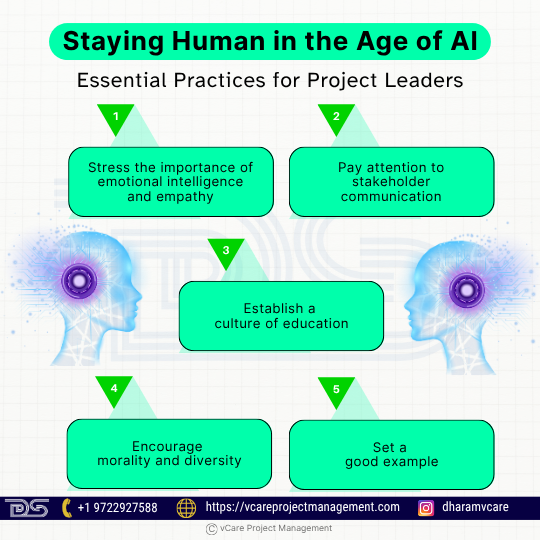
AI is reshaping project management, but empathy, ethics, and human judgement are what set great leaders apart.
The goal of remaining human is not to oppose AI. It involves balancing it with the enduring principles of leadership – vision, integrity, and compassion.
How PMI’s PMO Certification (PMOCP) Is Shaping the Future of Project Management Offices
I consider the PMI-PMOCP™ to be a strategic and timely development for PMO professionals. By coordinating project execution with overarching business objectives, the PMI PMOCP™ certification aims to identify and enable strategic PMO leadership. It emphasises practical, real-world skills like influence, agility, governance, and stakeholder engagement, all of which are critical in today’s changing environments.
By equipping professionals to lead significant organisational change rather than merely concentrating on status updates, it also fills important skill gaps in today’s PMOs. I gave a thorough rundown of the exam structure, application procedure, and efficient study methods in our most recent vCare webinar.
Having the PMOCP™ certification improves one’s reputation internationally and opens doors in various sectors and geographical areas. This certificate helps professionals land important roles and make strategic contributions to their organisations, whether they are creating a new PMO or expanding an existing one.
vCare Project Management is hosting a special webinar on the PMI-PMOCP™. The session features Kim Marcelliano, Senior Product Manager at PMI. She will share strategic insights on the credential’s relevance and target audience, while I will explain the exam structure, application process, and preparation tips. With their combined expertise, the webinar offers a clear path to PMO certification success. Ideal for PMO leaders and aspiring professionals, this session will provide valuable guidance to advance your career and strengthen your PMO’s strategic impact. So, don’t miss this opportunity, do check the webinar if you are interested.
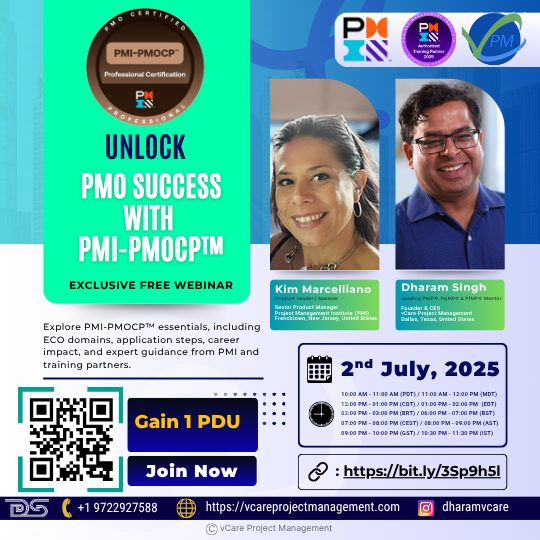
PMI-PMOCP is redefining PMO leadership. Learn how this new certification aligns strategy, agility, and impact.
Register Now: https://bit.ly/3Sp9h5l
Date: Wednesday, 02nd July 2025
Time: 10:00 AM – 11:00 AM (PDT) / 11:00 AM – 12:00 PM (MDT) / 12:00 PM – 01:00 PM (CDT) / 01:00 PM – 02:00 PM (EDT) / 02:00 PM – 03:00 PM (BRT) / 07:00 PM – 08:00 PM (CEST) / 08:00 PM – 09:00 PM (AST) / 09:00 PM – 10:00 PM (GST) / 10:30 PM – 11:30 PM (IST)
Guiding the Next Generation: My Approach to PgMP® and PfMP® Mentoring
Being a mentor is not just what I do, it’s what keeps me growing. Every interaction teaches me something new. While I have had the privilege of guiding over 570 PgMP®s and 177 PfMP®s worldwide, I consider myself a co-learner in this journey, growing alongside every professional I mentor.
PgMP® and PfMP® are more than just certifications. They stand for advanced governance skills, strategic thinking, and the capacity to match organizational objectives with program and portfolio objectives. The need for leaders with this degree of experience is growing as the project economy develops. These qualifications are increasingly crucial indicators of leadership prepared for the future.
Making this journey both meaningful and attainable is our mission at vCare Project Management. With tested mentoring models, organized preparation programs, and continuous support, we give candidates a clear path forward. Our goal is to help you pass, but we also want to help you become more confident and clear-headed in the process.
I provide advice to each person I mentor based on practical difficulties and knowledge gathered over many years of experience. There is no shortcut to success in PgMP® or PfMP®. It all comes down to comprehension, attitude, and steady support.
vCare Project Management can help you make the next big career move with purpose and precision.
The Road Ahead: Lifelong Learning and Collective Growth Beyond 55
As I turn 55, it feels perfectly timed that I have had the privilege of mentoring over 555+ aspirants, one for every year of my life and a few extra for good measure.
But a journey doesn’t end when you turn 55, but it marks the start of a new chapter based on in-depth education, significant mentoring, and a mutual dedication to the advancement of the field. There is a greater need than ever for strategic, forward-thinking leaders as the project landscape changes quickly and artificial intelligence changes how we lead and deliver.
There are still not many PgMP® and PfMP® certified professionals in the world, there are only 2500 PfMP®’s and 7900 PgMP®’s. Aspiring professionals have a significant opportunity here. These certifications represent more than just accomplishments. They serve as indicators of maturity, foresight, and the capacity to influence programs and portfolios.
“The function of leadership is to produce more leaders, not more followers.” – Ralph Nader
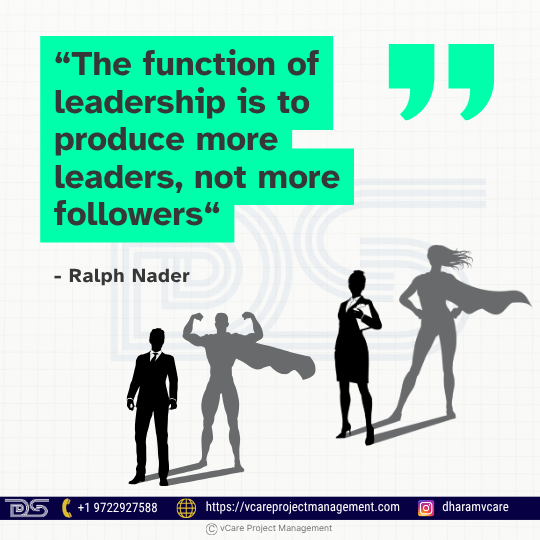
As Dharam Singh turns 55, he reflects on mentoring 555+ leaders and shaping the future of project and portfolio excellence.
Our goal at vCare Project Management is to enable people by providing them with organised mentoring, insightful guidance, and constant encouragement. We assist professionals in developing their leadership skills as well as their knowledge.
Now is a good time to think about your next project leadership move. The world needs competent, qualified individuals who are prepared to lead with clarity and purpose. At vCare, we are ready to provide you with forthright and specialist support during that journey.
Note: The figure of globally certified PgMPs & PfMPs is a guestimate based on available public sources and professional observations. Actual numbers may vary as PMI does not always publish real-time global certification data.
#DharamSingh #55YearsOfPurpose #PgMP #PfMP #PMOCP #ProjectLeadership #vCareProjectManagement #MentorshipMatters #StrategicPMO #AIandLeadership #PMICertification #FutureOfPMO #ProjectEconomy #PortfolioManagement #GlobalMentor #LeadershipReflection #LifelongLearning #EmotionalIntelligence #ProjectManagement
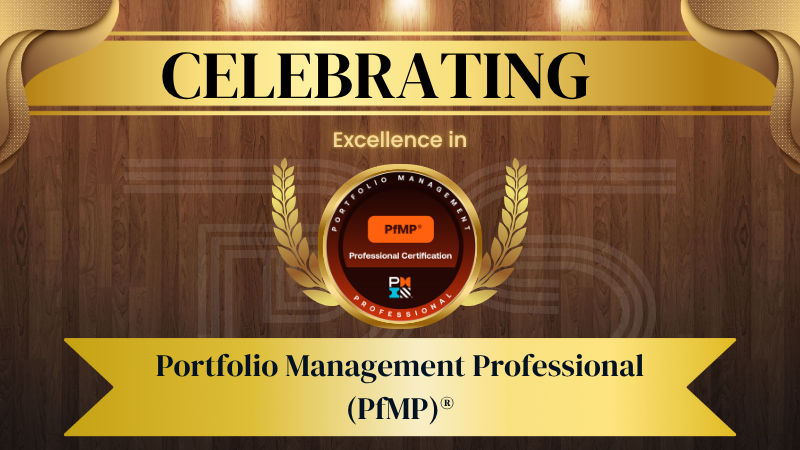
by DharamCW | Jun 14, 2025 | Leadership in Project Management, PMI Certification Success Stories, Professional Resilience and Inspiration Stories
🎉 Celebrating PfMP Success: March 2025 – May 2025! 🌟
A huge congratulations to all professionals who achieved their Portfolio Management Professional (PfMP) certification with the support of vCare Project Management! 🎯
🚀 We are thrilled to share that the global PfMP® community has now grown beyond 2,100+ certified professionals, with 176 new PfMP®s across 36 countries who trusted vCare’s expertise in their journey.
This milestone reflects the effectiveness of our structured training, mentorship, and exam preparation resources. We are proud to be part of your success and look forward to guiding more professionals to achieve excellence in portfolio management.
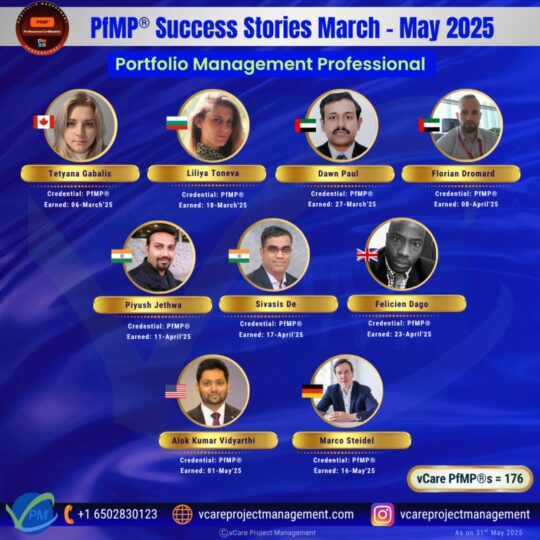
176 new PfMPs certified across 36 countries! Congratulations from vCare Project Management – March to May 2025.
🔹 Ready to elevate your portfolio management career?
Let’s make your PfMP® journey a success! DM me for guidance.
📌 Explore Our PfMP® Programs:
🌐 Online Training → http://bit.ly/39jOZSf
🏛 Direct Training → http://bit.ly/38er2M3
📌 Join Our PfMP® Community:
PfMP4U LinkedIn Group → http://bit.ly/31P7GKR
📌 Essential PfMP® Study Materials:
PfMP Pathfinder – https://bit.ly/35j9Dli
The Complete Reference Guide for PfMP Certification – https://bit.ly/3pU4ud5
PfMP Challenger Mock Exam 1 | Exam Simulator – https://bit.ly/3KKZkv3
PfMP Challenger Mock Exam 2 | Exam Simulator – https://bit.ly/3VlI5FH
PfMP Challenger Mock Exam 3 | Exam Simulator – https://bit.ly/3VNrfRL
PfMP Challenger Gold (Mock Exams 1 to 3) | Exam Simulator – https://bit.ly/3KCjbNh
📌 Register for our Upcoming Webinars:
🔹 Strategic Leadership & Operational Excellence featuring Jay Brough – bit.ly/41sSraX
🔹 Unlock PMO Success with PMI-PMOCP™: A Special Session with Dharam & Kim – bit.ly/3Sp9h5l
📌Need expert guidance? Book a free consultation with me: http://talktodharam.com
🎥 Stay Updated with Project Management Insights!
🔔 Subscribe to vCare Project Management YouTube Channel: https://bit.ly/2YF0wJl
🎙 Follow My Podcasts & Expert Interviews: https://bit.ly/2NDY8wd
#PfMP #PortfolioManagement #PfMPCertification #vCarePfMP #PMICertification #ProjectManagement #CareerGrowth #SuccessStory #GlobalCommunity #DharamSingh #PfMP4U #PfMPTraining #PfMPPathfinder #Leadership #MentorshipMatters #PfMPChallenger #CertificationJourney #PortfolioSuccess #PfMPMentoring #StrategyExecution
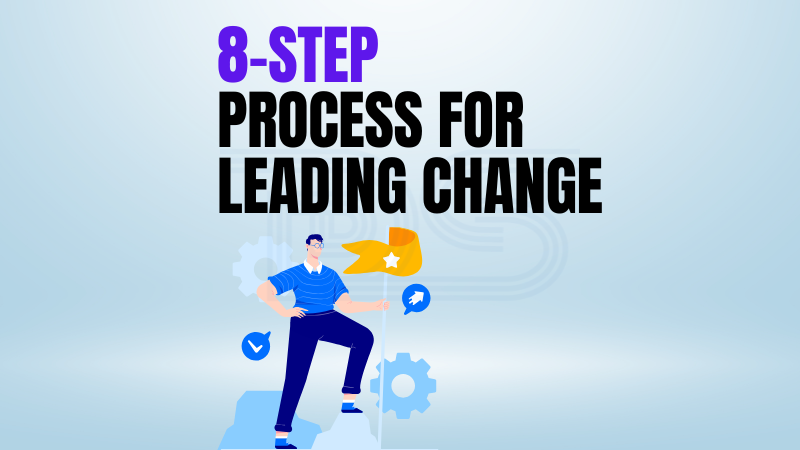
by DharamCW | May 28, 2025 | General, Leadership in Project Management
Driving change is never easy — but having a structured approach makes all the difference.
In my mentoring and consulting experience across 57+ countries, I’ve seen how organizations thrive when they follow a well-defined change framework.
Here’s a widely recognized and practical 8-Step Process for Leading Change that can support your transformation journey:
🔹 Step 1: Create urgency
Identify potential threats and opportunities that drive the need for change.
🔹 Step 2: Form a powerful coalition
Identify the change leaders. Change leaders are not necessarily based on hierarchy. The change leaders should be influential people from a variety of roles, expertise, social, and political importance.
🔹 Step 3: Create a vision for change
Identify the values that are central to the change. Then create a brief vision statement that summarizes the change. Next, identify a strategy to realize the vision.
🔹 Step 4: Communicate the vision
Communicate the vision throughout the change process. Apply the vision throughout all aspects of the organization. Senior management and the change coalition should consistently communicate the vision and demonstrate the urgency and benefits of the change.
🔹 Step 5: Remove obstacles
All change comes with obstacles. Sometimes the obstacles are outdated processes, sometimes they are based on the organizational structure, and sometimes they are people resistant to change. Regardless, all obstacles need to be addressed.
🔹 Step 6: Create short-term wins
Identify quick and easy wins to build momentum and support for the change.
🔹 Step 7: Build on the change
Once the short-term wins are complete, the organization needs to set goals for continued improvement.
🔹 Step 8: Anchor the changes in corporate culture
Ensure the change becomes ingrained into the culture: continue to communicate the vision, tell success stories, recognize people in the organization who embody and empower the change, and continue to support the change coalition.
At vCare Project Management, I work closely with professionals navigating change at project, program, and portfolio levels.
💬 How does your team ensure that change efforts are sustained long term?
Let’s discuss below.
View our upcoming PMP Programs
Online → https://bit.ly/2BU0mFp
Direct → http://bit.ly/3ic7GRF
View our upcoming PgMP® Programs
Online → http://bit.ly/2oBKQXQ
Direct → http://bit.ly/2oCfpg0
View our upcoming PfMP® Programs:
Online → http://bit.ly/39jOZSf
Direct → http://bit.ly/38er2M3
🎙️ Got questions about your Project Management career or PMI certifications?
Book your FREE 15-min session with me at 👉 www.talktodharam.com
📞 Contact Us
Call: 650-283-0123
Email: info@vcareprojectmanagement.com
🎧 Subscribe & Stay Ahead
Webinars & Success Stories: https://bit.ly/2YF0wJl
Podcasts & Interviews: https://bit.ly/2NDY8wd
#ChangeLeadership #PgMP #PfMP #vCareProjectManagement #ProgramManagement #StrategyExecution #PortfolioManagement #DharamSingh #ProjectManagement #LeadingChange #OrganizationalTransformation #LeadershipFramework #ChangeManagement #MentorshipMatters #ProjectSuccess #SustainableChange #ChangeChampions #KotterModel
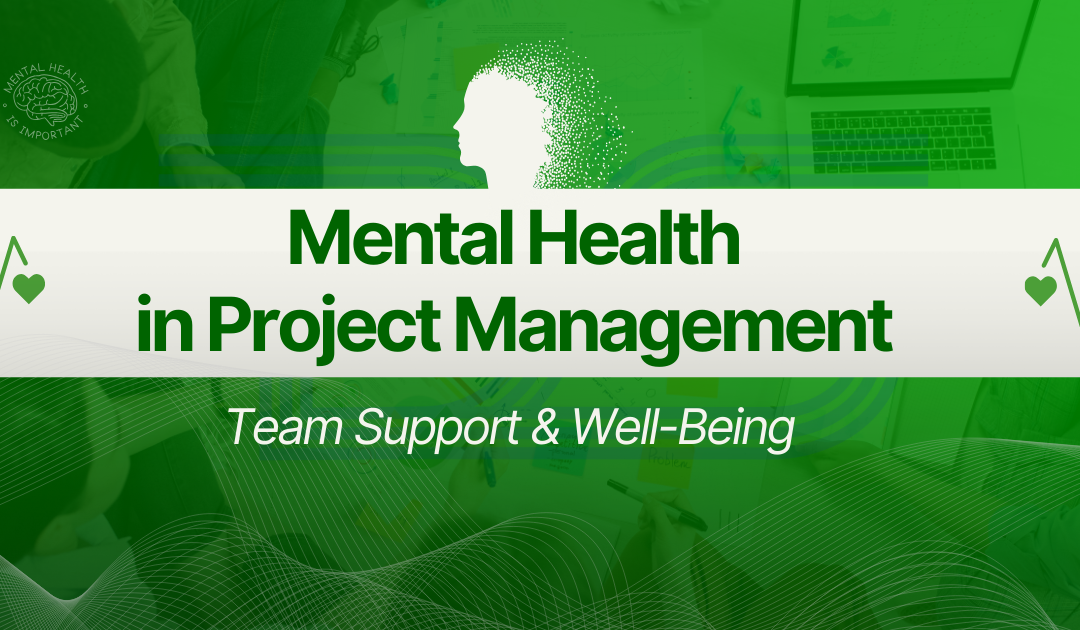
by DharamCW | May 25, 2025 | General, Leadership in Project Management, Personal, Professional Resilience and Inspiration Stories
Project management is a challenging yet rewarding task in the corporate world, requiring multitasking, team dynamics, and timely delivery. Project managers are responsible for enhancing team wellbeing and stress reduction, benefiting both the team and themselves. They can achieve this by providing realistic timeframes, budgets, and fostering high-performing teams. They also monitor team performance to identify signs of burnout and stress, offering coping mechanisms when needed. Project managers must prioritize their teams’ welfare by engaging in their duties to manage projects and lead teams.
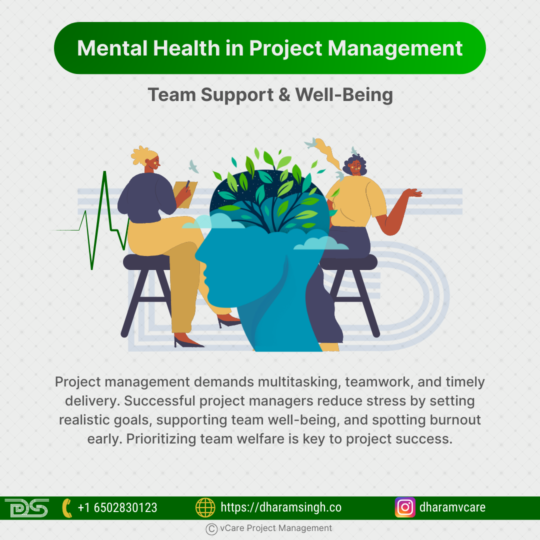
Great project managers don’t just lead projects—they lead people. Supporting team wellbeing drives sustainable success and peak performance.
Project management is a demanding field that requires balancing deadlines, team relations, and excellence. The corporate culture often overlooks the importance of mental health treatment, creating an artificial opposition between vulnerability and toughness. Project managers can model a new leadership culture that prioritizes project success and mental health. This requires a more nuanced definition of resilience, focusing on emotional intelligence, adaptability, and an active attitude towards mental health.
To address this issue, project managers should promote open conversations about mental health and implement policies that enhance team members’ welfare. This article is aimed at project managers and organizations looking to build leadership skills and create a culture where mental health is a key element of success.
Why Mental Health Matters in Project Management?
Mental health is essential in project management since an anxious or burnt-out team will be able to significantly contribute to the failure of a project by causing low productivity, bad decisions, increased turnover, and ultimately, project failure; hence, giving mental health priority in a project team is very important to get best project outcomes.
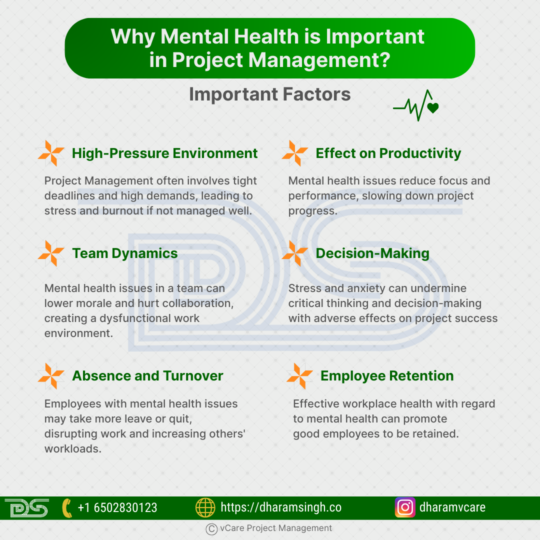
Strong project management starts with strong minds. Learn why prioritizing mental health leads to resilient, high-performing teams.
Important factors why mental health is important in project management:
1. High-pressure environment: Project management is most frequently marked by tight schedules, complicated activities, and high expectations, which readily create burnout, stress, and anxiety if not properly handled.
2. Effect on productivity: When employees are suffering from mental health problems, their attention, concentration, and overall performance are diminished, leading to a deceleration in project progress.
3. Team dynamics: Having an employee with mental issues can ruin team morale and collaboration, leading to a dysfunctional working environment.
4. Decision-making: Stress and anxiety can undermine critical thinking and decision-making with adverse effects on project success.
5. Absence and turnover: Mental illness workers will likely take more sick leave or leave the company, causing disruption to operations and adding workloads to other employees.
6. Employee retention: Effective workplace health with regard to mental health can promote good employees to be retained.
Common Mental Health Challenges in Project Management
Common mental health problems faced by the project managers are stress, anxiety, burnout, depression, and sleep disturbance, typically triggered by problems like tight deadlines, high stakes, complex demands of the projects, scope changes, and inadequate resource allocation, which leave the managers feel overwhelmed and out of control.
Discussions on mental health are becoming increasingly common in the workplace, since 15% of workers between the ages of 18 and 29 believe their mental health is severely bad. 70% of senior staff members lack the requisite training to have conversations with their teams on mental health, according to a recent National Alliance on Mental Illness (NAMI) survey. Also, The World Health Organization estimates that depression and anxiety cause 12 billion lost working days a year, which translates into $1 trillion in lost productivity. This means that an employee’s mental health has a big influence on their company. As a result, workplace mental health has to be given more attention.
The following are some professional mental health risk factors:
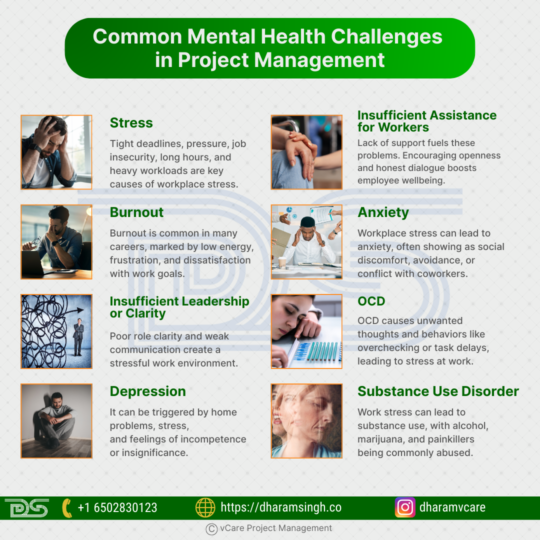
Recognize the warning signs. From stress and burnout to anxiety and OCD—mental health challenges are real and manageable in the workplace.
· Stress – This is the primary cause of poor mental health at work. Deadlines, pressure from supervisors or coworkers, job uncertainty, long hours, and a high workload are all sources of stress.
·Burnout – The majority of employees encounter burnout at some point throughout their career. Lack of drive and enthusiasm, impatience, irritation, and dissatisfaction with work objectives and achievements are all signs of job burnout.
· Insufficient leadership or clarity – A stressful work atmosphere is created when roles and duties are not clearly defined, or when management and staff do not communicate effectively.
· Insufficient assistance for workers – The root cause of all of these issues and more is a lack of employees support. By offering forums for employees to voice their thoughts, complaints, and opinions, being transparent about mental health concerns are all ways to support employees.
· Depression – Depression, a major depressive disorder, affects 17.3 million adults in the U.S., including 7.1% of people aged 18 and older. It can be triggered by home problems, stress, and feelings of incompetence or insignificance.
· Anxiety – Anxiety is a common mental health issue in the workplace, often resulting from stress. It can manifest as social anxiety, which involves avoiding happy hours, difficulty confronting co-workers, or interpersonal struggles. General anxiety, on the other hand, is characterized by worry about the future at the company, constant stress over deadlines or tasks, or perceived tension and disaster.
· OCD – Obsessive-Compulsive Disorder (OCD) is a serious disorder that can manifest as persistent, unwanted thoughts or obsessions, multiple rereads of a project, or difficulty completing daily tasks. These issues can lead to significant stress and strain in the workplace.
· Substance Use Disorder – Triggered by stress or negative work-related issues, often leads to substance use. Commonly abused substances include alcohol, marijuana, and painkillers. This is not just a one-time event; it’s a mental disorder involving brain rewiring and chemical imbalances. 9.5% of working adults have a substance use disorder, and it can lead to poor decision-making, missed work, increased conflict, and other negative outcomes.
Reasons why mental illness peaked in project management in recent times
· Unrealistic timelines: Tight deadlines might create unnecessary tension and lead to rushed decisions.
· Scope creep: Ongoing variations in project scope can lead to confusion and cumulative workload.
· Lack of adequate communication: Unclear communication to stakeholders can develop misunderstandings and tension.
· Poor resource allocation: Insufficient human resources or necessary competencies to carry out a project might lead to frustration and burnout.
· Work-life imbalance: Failure to separate work life and personal life with long work hours and unnecessary demands.
Ways to minimize mental health problems in project management
· Healthy work-life balance: Support normal breaks, holidays, and flexible working hours.
· Open communication: Build an open atmosphere where staff members are free to openly speak about problems and concerns.
· Good project planning: Set attainable objectives, handle expectations, and forecast potential risks.
· Stress management methods: Provide exposure to mindfulness instruction, relaxation training, and staff aid schemes.
· Leadership development: Provide project managers with the ability to handle stress, delegation, and assistance of team members.
The Role of Project Managers in Supporting Mental Health of their team members
Project managers play a crucial role in fostering a healthy workplace by addressing the mental health of their team members. Overwork, poor management techniques, and lack of support can lead to stress, anxiety, and despair, resulting in a toxic atmosphere. Bullying and harassment may also contribute to these issues. To overcome these issues, project managers should identify their root causes and adopt proactive measures such as stress management resources, leadership training, anti-harassment measures, and a positive work atmosphere. This not only improves team performance and project success but also fosters a healthier workplace by ensuring that excessive demands do not worsen team members’ mental health.
Project Managers’ Role in Mental Health
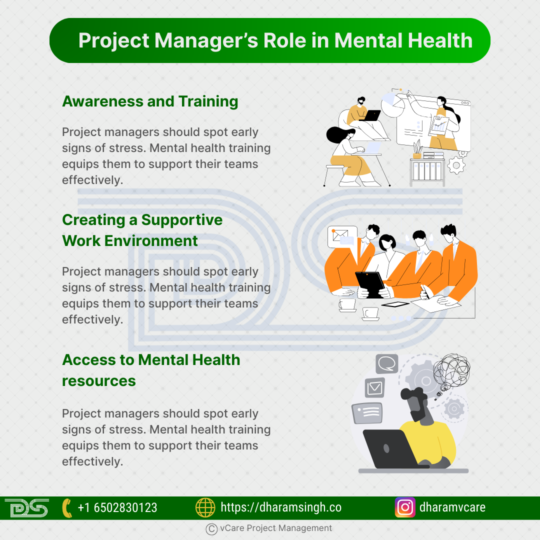
Project managers can shape a healthier workplace. From awareness to access—lead the change for better mental wellbeing in your teams.
· Awareness and Training:Project managers must be able to identify the early signs of mental stress. Training that emphasizes mental health awareness may provide managers the tools they need to properly assist their personnel.
· Creating a Supportive Work Environment:It’s critical to have a culture at work that values employees’ well-being. Realistic expectations, breaks, and open discussions regarding mental health issues should all be promoted by managers.
· Access to Mental Health resources:It’s critical to guarantee that team members have access to mental health assistance. This entails forming relationships with healthcare providers and providing resources in an accessible manner.
Facts that Long-Term Effects of Ignoring Team’s Mental Health in project management
· Impact on Productivity:Long-term stress and burnout impair team productivity and project success in addition to lowering individual performance.
· Issues with Retention and Turnover: An expensive and disruptive cycle of training and retraining can result from high turnover rates, which are a result of high stress conditions.
· Organizational Reputation:Businesses that have a bad reputation for handling work-related stress may have trouble attracting top people, which might hurt their ability to compete in the market.
Ways to Improve Mental Health amongst the team members in project management
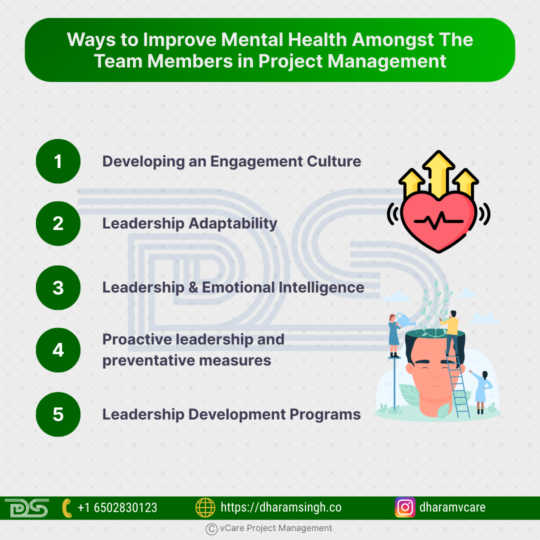
Effective leadership goes beyond task management. Learn five ways project leaders can nurture mental health and build resilient, thriving teams.
1. Developing an Engagement Culture
Leadership principles have a significant impact on a team’s culture. For example, democratic and transformative leaders frequently promote an environment of transparency and participation. These settings foster initiative and idea sharing among team members, which can boost their commitment to project results and job happiness. Effective communication, mutual support, and a shared goal are all characteristics of engaged teams that lower the risk of burnout.
2. Leadership Adaptability
The flexibility of leadership styles is a crucial element that isn’t specifically addressed in the table. In order to better address the demands of their team under changing conditions, effective leaders frequently combine aspects of several styles. For instance, in order to swiftly establish precise goals and standards in the early phases of a project, a more autocratic approach may be required. Including democratic components can assist the team stay engaged and motivated as the project moves forward, lowering the stress and powerlessness that cause burnout.
3. Leadership & Emotional Intelligence
In order to manage stress and avoid burnout, leaders must possess emotional intelligence. Emotionally intelligent leaders are able to identify the psychological and emotional requirements of their team members. They are skilled at adapting their support, encouragement, and communication tactics to the moods of the team and the individual. This skill is especially helpful in high-stress situations when customized support may reduce tension before it becomes burnout.
4. Proactive leadership and preventative measures
The goal of proactive leadership is to foresee certain stressors and put plans in place to lessen them before they have an adverse effect on the team. By proactively identifying the symptoms of burnout, leaders may reduce stress by adjusting workloads, project scopes, and deadlines. Furthermore, providing tools for mental health assistance, such as stress management classes and access to counseling, may improve team well-being.
5. Leadership Development Programs
Project managers and leaders may successfully modify their management style to meet the demands of their team by investing in leadership development programs. The range of conflict resolution, emotional intelligence, stress management, and leadership styles should all be included in these programs. A more thorough knowledge of how leadership affects mental health might help organizations better equip their leaders to build wholesome, effective teams.
Many people still fail to recognize the intensity of stress at work, concentrating only on results and ignoring the human factor. Project managers who are unable to adequately manage workload risk not only team burnout but also leadership failure.
Including Mental Health Wellness Techniques in Project Management
· Proactive Mental Health Initiatives:Implementing proactive mental health efforts, including as wellness programs, stress management seminars, and routine mental health check-ins, can aid in the early detection and treatment of mental health and stress-related problems.
· Flexible Work Schedules:Promoting remote work and flexible work schedules may greatly lower stress, enhance work-life balance, and, consequently, improve mental health.
· Systems for Acknowledgment and Compensation:A more balanced attitude to work is encouraged by putting in place procedures that acknowledge and reward both results and good work habits, which highlights the significance of mental health.
Project managers are tasked with protecting their team’s mental health, preventing stress and fostering a productive work environment. They must prioritize their teams’ mental and emotional health above any project milestone. By broadening their focus to include these crucial components, project managers can ensure their teams are not only successful but also content and healthy in their work environments, ensuring a healthy and productive work environment.
Toolkit for Project Managers and Teams on Mental Health
Building a Mental Health Toolkit for company employees entails gathering tools and tactics to promote workers’ mental health.
Here are some essential components to incorporate:
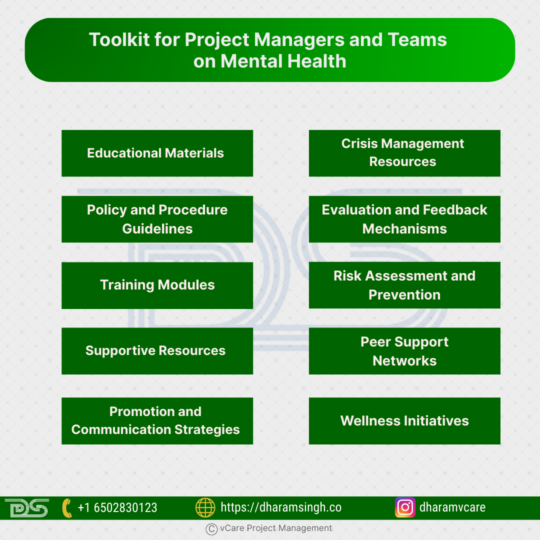
Equip your project team with the right tools. This mental health toolkit empowers leaders to build supportive, resilient, and high-performing workplaces.
1. Educational Materials: This document provides information on mental health disorders, workplace stigma reduction, stress management resources, resilience building, and self-care.
2. Policy and Procedure Guidelines: Sample policies for mental health support and accommodations, workplace crisis handling procedures, and guidelines for confidentiality and privacy regarding mental health issues.
3. Training Modules: Training sessions for managers and employees on mental health, communication skills, empathy, active listening, and promoting work-life balance are being conducted to prevent burnout.
4. Supportive Resources: This document provides contact information for mental health professionals, EAPs, helplines, referral pathways for counseling, therapy, or psychiatric services, and information on insurance coverage for mental health treatment.
5. Promotion and Communication Strategies: This document provides materials for raising mental health awareness, communication strategies for promoting initiatives, and platforms for sharing success stories, testimonials, and best practices within an organization.
6. Crisis Management Resources: This document provides protocols for handling workplace mental health emergencies, emergency contact information, and immediate support and follow-up care for employees in crisis.
7. Evaluation and Feedback Mechanisms: The toolkit involves surveys for feedback on mental health initiatives’ effectiveness, monitoring metrics like absenteeism and turnover rates, and regular reviews and updates to the toolkit based on feedback and organizational needs.
8. Risk Assessment and Prevention: This document provides tools for assessing workplace stressors, strategies for preventing bullying, harassment, and discrimination, and resources for promoting psychological safety and inclusion.
9. Peer Support Networks: The text suggests implementing peer support systems, training employees to offer mental health guidance, and promoting open discussions and forums for employees to discuss challenges and coping strategies.
10. Wellness Initiatives: Programs promoting physical activity, healthy eating, and sleep hygiene, as well as supportive work environments like flexible schedules and remote work options, are essential for a healthy lifestyle.
Real-world examples of organizations successfully addressing mental health
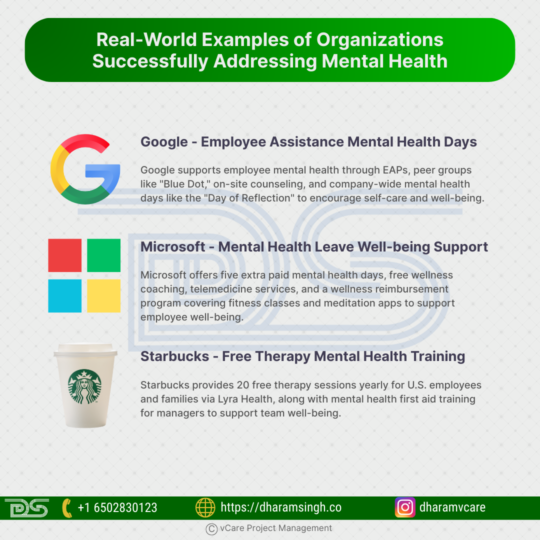
From Google to Nike—these 10 companies are redefining how workplace mental health is approached through proactive, supportive, and sustainable practices.
1. Google – Employee Assistance & Mental Health Days
Employee Assistance Programs (EAPs), peer support groups like “Blue Dot” where employees may openly discuss mental health concerns, and on-site counseling services are just a few of the mental health initiatives that Google has implemented. It also organizes company-wide mental health days, such as the “Day of Reflection,” to motivate staff to prioritize their health and take breaks.
2. Microsoft – Mental Health Leave & Well-being Support
In order to provide employees more time to concentrate on their mental health, Microsoft provides five extra paid mental health days annually. They offer free access to mental wellness coaching for employees and treatment via telemedicine services. Microsoft also offers a wellness reimbursement program that pays for things like exercise classes and meditation applications that promote mental and emotional well-being.
3. Unilever – Mental Health Champions & Flexible Work
Unilever has created a global network of Mental Health Champions, which consists of trained staff members who provide peer support and help create a psychologically safe workplace. They promote “agile working” as well, which enables employees to design flexible work schedules that accommodate their needs for both personal and mental well-being.
4. Deloitte – Mental Health Ambassadors & DE stigmatization Campaigns
Deloitte has taken the lead in addressing workplace mental health by appointing mental health champions and initiating awareness campaigns to reduce the stigma attached to discussing mental health. Their “This is Me” initiative encourages employees to submit personal stories regarding mental health in order to foster an open and supportive work environment.
5. Starbucks – Free Therapy & Mental Health Training
Through the Lyra Health platform, Starbucks offers 20 complimentary therapy sessions annually to all U.S. employees and their families. Additionally, the company provides shop managers with mental health first aid training, enabling them to identify symptoms of distress and provide team members with the right kind of assistance.
6. PwC (PricewaterhouseCoopers) – Mental Health Coaching & Well-being Apps
By providing subsidized therapy sessions and one-on-one mental health coaching, PwC has incorporated mental health into its overall well-being plan. Additionally, employees have access to applications for mental health like Headspace and Thrive, which offer stress-reduction techniques, mindfulness training, and guided meditation.
7. Accenture – Employee Assistance & Resilience Training
Comprehensive Employee Assistance Programs (EAPs) from Accenture include mindfulness training, round-the-clock counseling, and individualized mental resilience training. Additionally, they have a “Truly Human” campaign that highlights the value of mental health and self-care in a high-achieving workplace.
8. Johnson & Johnson – Holistic Mental Health Approach
With an emphasis on physical, emotional, mental, and spiritual well-being, Johnson & Johnson incorporates mental health into their “Energy for Performance” program. Employees have access to mental fitness training, on-site mental health counseling, and company-sponsored mindfulness and meditation programs.
9. Salesforce – Mindfulness Rooms & Employee Well-being Grants
Salesforce supports workplace mental health by providing employee well-being grants that enable staff members to receive financial assistance for mental health services like coaching, therapy, or wellness retreats, as well as by creating “Mindfulness Zones,” which are quiet areas in offices where staff members can meditate or take breaks.
10. Nike – Global Mental Health Training & Paid Rest Days
Nike started a program called “Mental Health First Aid” to teach employees and managers how to identify and handle mental health issues. In order to minimize burnout and promote mental recuperation, they also instituted paid rest days for the whole organization, such as a full week off for corporate workers.
Strategies for a Balanced Approach in Project Management
So, from all the real-world examples of organizations successfully addressing mental health, an effective project management is now crucial for businesses to keep ahead of the competition in the increasingly complicated and competitive business sector. The capacity to properly manage a project is crucial to its success, regardless of its size.
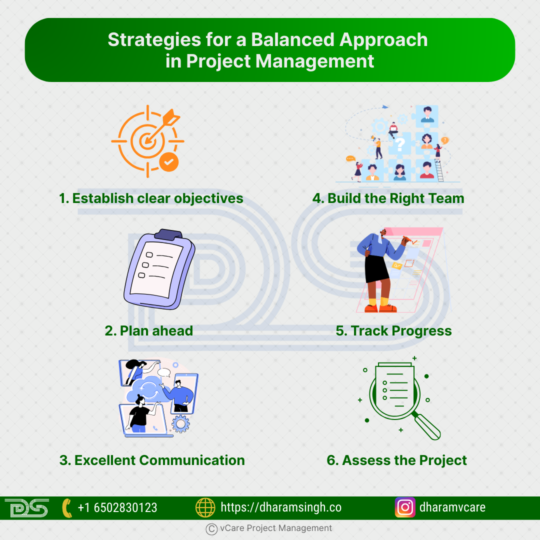
A successful project isn’t just about deadlines—it’s about clarity, teamwork, communication, and care. Here’s how to strike the right balance.
· Establish clear objectives: Having well-defined objectives is important for effective project management. Make sure that everyone engaged is aware of the project’s goals and that they are clearly defined.
· Plan ahead: Developing a strategy that details the actions necessary to accomplish your project’s objectives is the next stage. Create backup plans to deal with any obstacles that may arise. A project’s budget, schedule, and necessary resources should all be included in a solid plan.
· Excellent Communication: The keys to successful project management is excellent communication. Continually update all stakeholders on the status of the project and any modifications to its scope or schedule. Organize frequent check-ins or meetings to make sure everyone is in agreement.
· Build the Right Team: The team that works on a project has a big impact on its success. For each activity, make sure you have the appropriate individuals with the requisite training and expertise. Promote cooperation and teamwork to create a happy workplace.
· Track Progress: Monitoring progress is crucial to making sure the project is proceeding as planned and that objectives are being fulfilled. To monitor developments, spot any bottlenecks, and make necessary corrections, use project management software.
· Assess the Project: After the project is finished, spend some time assessing its effectiveness. Determine what needs to be improved, then make the necessary adjustments for next projects.
Conclusion
In project management, mental health is not only a primary issue, rather it is a critical component that affects team output, performance, and project success as a whole. The necessity for project managers to provide a supportive atmosphere where team members feel heard, respected, and capable of managing stress has been highlighted by the increased awareness of mental health issues in the workplace.
Project managers need to think about these important concerns in order to address these challenges:
· How to successfully strike a balance between team well-being and high performance standards in order to avoid burnout?
· What techniques may employ to foster a psychologically healthy workplace?
· What is the effect of emotional intelligence on a project manager’s capacity to encourage team morale and motivation?
· What part does risk management play in recognizing and reducing mental health risks?
· How to help teams who are dealing with unpredictability and short timelines become more resilient and adaptable?
The first step in addressing the influence of mental health on both individuals and teams in project management is to comprehend why it matters. Burnout, short deadlines, and a poor work-life balance are common issues that can lower morale and productivity. This emphasizes how important it is for project managers to foster an environment of open communication, psychological safety, and proactive assistance.
In order to enhance the well-being of team members, businesses need to put into practice useful tactics, such as mental health toolkits, organized support systems, and training courses that enable managers to identify and successfully handle mental health issues. Furthermore, a comprehensive strategy that incorporates flexible work arrangements, stress management programs, and practical project planning is needed to strike a balance between project needs and employee well-being.
Organizations have shown that prioritizing mental health initiatives leads to stronger teams and better project outcomes. By embedding mental health awareness into project management practices, organizations can create a healthier, sustainable work environment that benefits both employees and project success. Fostering a culture of mental well-being should be an integral part of the project leadership.
#ProjectManagement #MentalHealthAwareness #TeamWellbeing #BurnoutPrevention #LeadershipDevelopment #vCareProjectManagement #DharamSingh #PMICertification #ProjectSuccess #EmployeeSupport #WorkplaceWellness #LeadershipMatters #HealthyTeams #MentalHealthToolkit #EmotionalIntelligence #FlexibleWork #CorporateCulture #StressManagement #ProjectLeadership #WellbeingAtWork
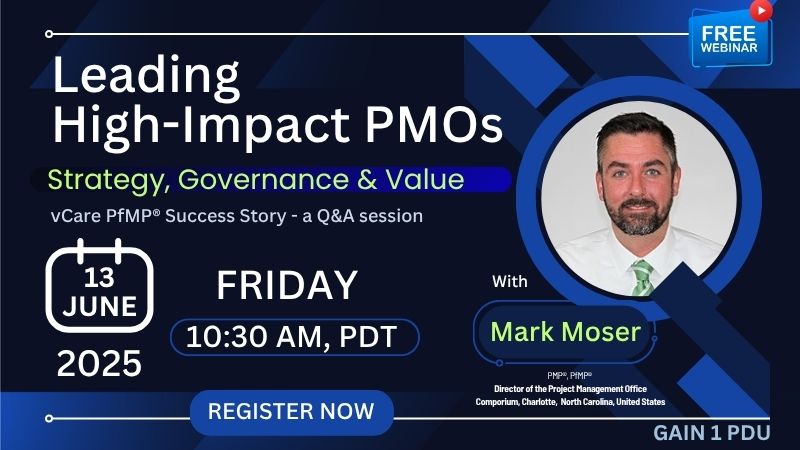
by DharamCW | May 23, 2025 | Leadership in Project Management, Professional Development Webinars
🚀 Transform Your PMO Vision into Strategic Impact!
Join me and the vCare Project Management community for an exclusive webinar featuring Mark Moser, MBA, PMP, PfMP, CSM, LSSBB – Director of the Project Management Office at Comporium, Charlotte, NC, USA.
With 15+ years leading PMOs across healthcare, telecom, and corporate sectors, Mark has earned a reputation for turning complex initiatives into measurable success stories. From ERP rollouts to enterprise dashboarding and capability building, he brings actionable wisdom every PMO leader needs.
Session Date: Friday, 13th June 2025
Session Time:
10:30 AM – 11:30 AM (PDT) / 11:30 AM – 12:30 PM (MDT)
12:30 PM – 01:30 PM (CDT) / 01:30 PM – 02:30 PM (EDT)
02:30 PM – 03:30 PM (BRT) / 06:30 PM – 07:30 PM (BST)
07:30 PM – 08:30 PM (CEST) / 08:30 PM – 09:30 PM (AST)
🔗 Reserve Your Spot Now → https://bit.ly/43s8KVl
🎯 Key Takeaways from the Webinar:
– Laying the Foundation: The First Three Strategic Moves in Building a PMO from Scratch
– From Data to Decisions: How Executive Dashboards Drive Strategic Alignment
– ERP Excellence: Lessons from Leading Multi-Million Dollar, Enterprise-Wide Initiatives
– Bridging the Certification Gap: Training Non-Certified Teams on PMI Best Practices
– Defining High-Impact: What Sets Top-Performing PMOs Apart in Today’s Business Landscape
🎓 Earn 1 PDU
🎁 Special Discounts on upcoming PMP, PgMP & PfMP programs
💬 Book a 1-on-1 call with me: http://talktodharam.com
📌 Explore More:
PfMP Online Training → http://bit.ly/39jOZSf
PfMP Direct Training → http://bit.ly/38er2M3
PfMP4U LinkedIn Group → http://bit.ly/31P7GKR
Let’s redefine PMO leadership—together.
#PMO #PfMP #PMP #ProjectLeadership #ERPStrategy #PortfolioManagement #vCareProjectManagement #PMOTransformation #MarkMoser #DharamSingh #StrategicExecution #PMWebinar #ProgramManagement #LeadershipDevelopment #Comporium #PMICertifications
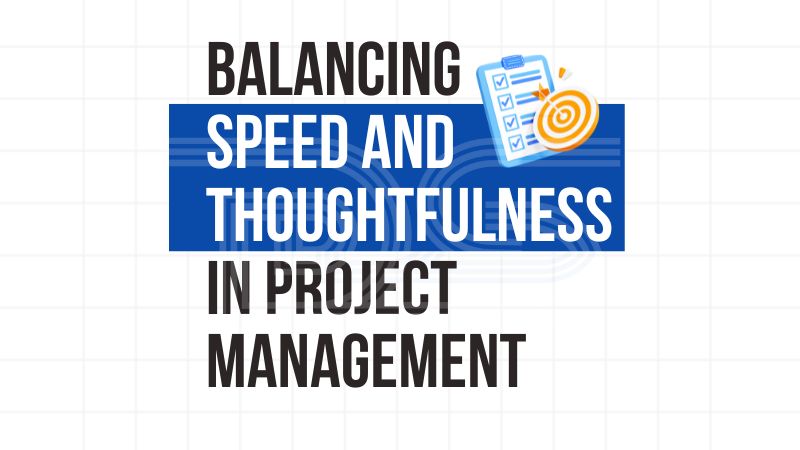
by DharamCW | May 15, 2025 | General, Leadership in Project Management
⏱️ In the rush to deliver fast, are you forgetting to deliver right?
After mentoring hundreds of project, program, and portfolio managers, I’ve seen one truth stand out: Speed means nothing without thoughtfulness. Swipe through these 5 essential principles to help you find that balance 👇
✅ Prioritize What Matters
– Identify the most critical tasks and focus your resources there
– Not everything needs to be done quickly — some things need to be done right
✅ Plan for Agility
– Use flexible frameworks like Agile or iterative planning
– This helps you adapt to changes while maintaining a thoughtful approach
✅ Communicate Clearly
– Keep your team aligned with clear, concise updates on priorities and timelines
– Thoughtfulness in communication reduces confusion and builds trust
✅ Evaluate Risks Carefully
– Weigh the trade-offs between speed and long-term impact
– Take calculated risks but avoid shortcuts that could lead to project failures
✅ Reflect and Refine
– After each phase, review what worked and what didn’t
– Continuous improvement ensures that speed and thoughtfulness remain balanced throughout the project
💭 Fast isn’t always forward.
👉 How do you personally balance speed with thoughtfulness in your projects?
Let’s open the conversation.
View our upcoming PMP Programs
Online → https://bit.ly/2BU0mFp
Direct → http://bit.ly/3ic7GRF
View our upcoming PgMP® Programs
Online → http://bit.ly/2oBKQXQ
Direct → http://bit.ly/2oCfpg0
View our upcoming PfMP® Programs:
Online → http://bit.ly/39jOZSf
Direct → http://bit.ly/38er2M3
🎙️ Got questions about your Project Management career or PMI certifications?
Book your FREE 15-min session with me at 👉 www.talktodharam.com
📞 Contact Us
Call: 650-283-0123
Email: info@vcareprojectmanagement.com
🎧 Subscribe & Stay Ahead
Webinars & Success Stories: https://bit.ly/2YF0wJl
Podcasts & Interviews: https://bit.ly/2NDY8wd
#ProjectManagement #PgMP #PfMP #PMP #Agile #Leadership #StrategicThinking #DharamSingh #vCareProjectManagement #SpeedVsQuality #PMICertifications #ContinuousImprovement #RiskManagement #TeamAlignment #ProjectLeadership
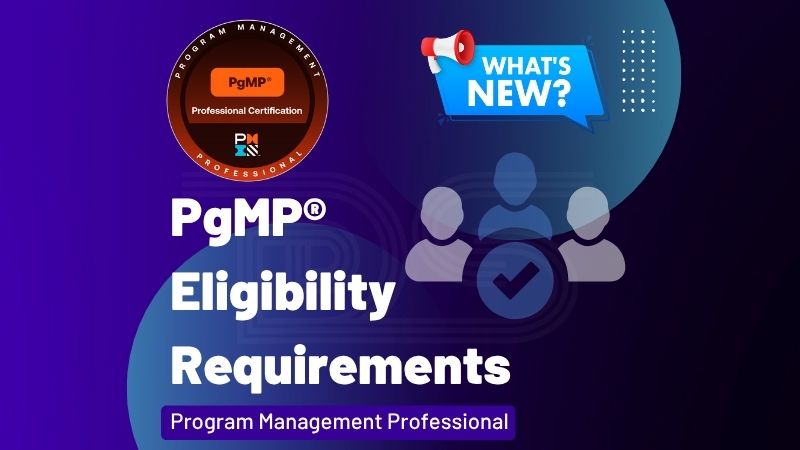
by DharamCW | May 11, 2025 | General, Industry Trends and Insights, Leadership in Project Management, PMI Certification Insights, Program Management
🎯 Is Program Management Professional (PgMP) certification the next step in your leadership journey? Before you jump in! Do you know which path you’re eligible through?
Let me make it simple for you 👇
✅ Set A – High School / Secondary Diploma
📌 48 months of project management experience (or PMP®)
📌 84 months of program management experience
🕒 All within the past 15 years
✅ Set B – Bachelor’s Degree or Higher (Global Equivalent)
📌 48 months of project management experience (or PMP®)
📌 48 months of program management experience
🕒 All within the past 15 years
✅ Set C – GAC-Accredited Degree (Bachelor’s or Master’s)
📌 36 months of project management experience (or PMP®)
📌 36 months of program management experience
🕒 All within the past 15 years
🚀 I’ve personally mentored 551+ PgMP® certified professionals across 57+ countries, including 168+ from the United States alone.
View our upcoming PgMP Programs
Online – http://bit.ly/2oBKQXQ
Direct – http://bit.ly/2oCfpg0
📅 If you’re unsure where you fit or how to prepare,
👉 Book a 15-minute, obligation-free session with me:
http://talktodharam.com
📞 For queries: +1 650-283-0123
💬 Which set do YOU fall under—A, B, or C?
Comment below and let’s discuss your PgMP® path!
#PgMP #ProgramManagement #PgMPEligibility #DharamSingh #vCareProjectManagement #StrategicLeadership #PMICertifications #PMI #PgMP2025 #CareerAdvancement #LeadershipJourney #ProjectToProgram #pgmpexamprep












































Recent Comments